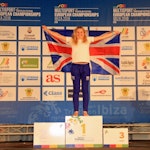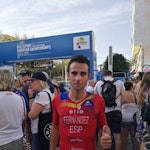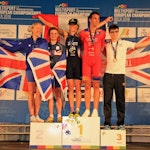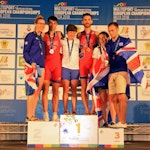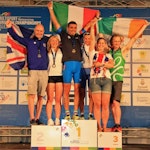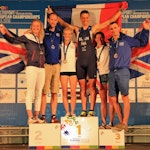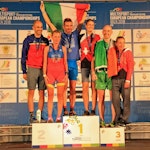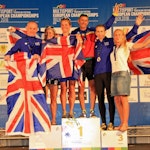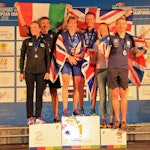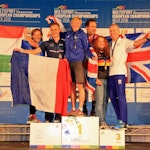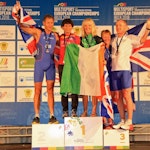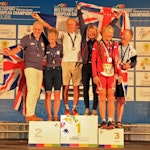The 2018 Multisport Festival held at the end of the season in Ibiza was once more a success for the hundreds of British athletes who travelled over land, by sea and by plane to the party island of Ibiza. Easily the biggest team, easily the most vocal and easily the most successful. The British Age-Groupers truly dominated the Duathlon, both sprint and standard. “How come the Brits can take home so many medals?” Well, the many hundreds of events that are available on the race calendar in Great Britain offer a wide range of distances and challenges. Yes, there are many, many athletes North of the English Channel who race exclusively over the longer distances and who focus on the high-cost commercial races, but put simply, the opportunities to race at affordable events, added to a real determination by BTF to encourage participation at all levels always did pay off.
Turn the clock back to when Lycra was the new fashion and where wrap-around sunglasses were the rage. Triathlon came to the UK as a bit of a sideshow and was run from a tiny office in Dover Swimming Pool. With a staff of one permanent employee and a dedicated secretary, the entire sport was run on a shoestring by Ian Pettitt. With the advent of the World Championships and a chance to race for their country, the Brits leapt at the chance and were richly rewarded for their efforts. These rewards were never financial, but rather in the form of status. Local newspapers were keen to publish articles about their local athletes, local companies offered support in the form of products (nutrition, bike parts, perhaps a race uniform) and slowly but surely the Brits started to create the identity and team spirit that we now see at each and every international event.
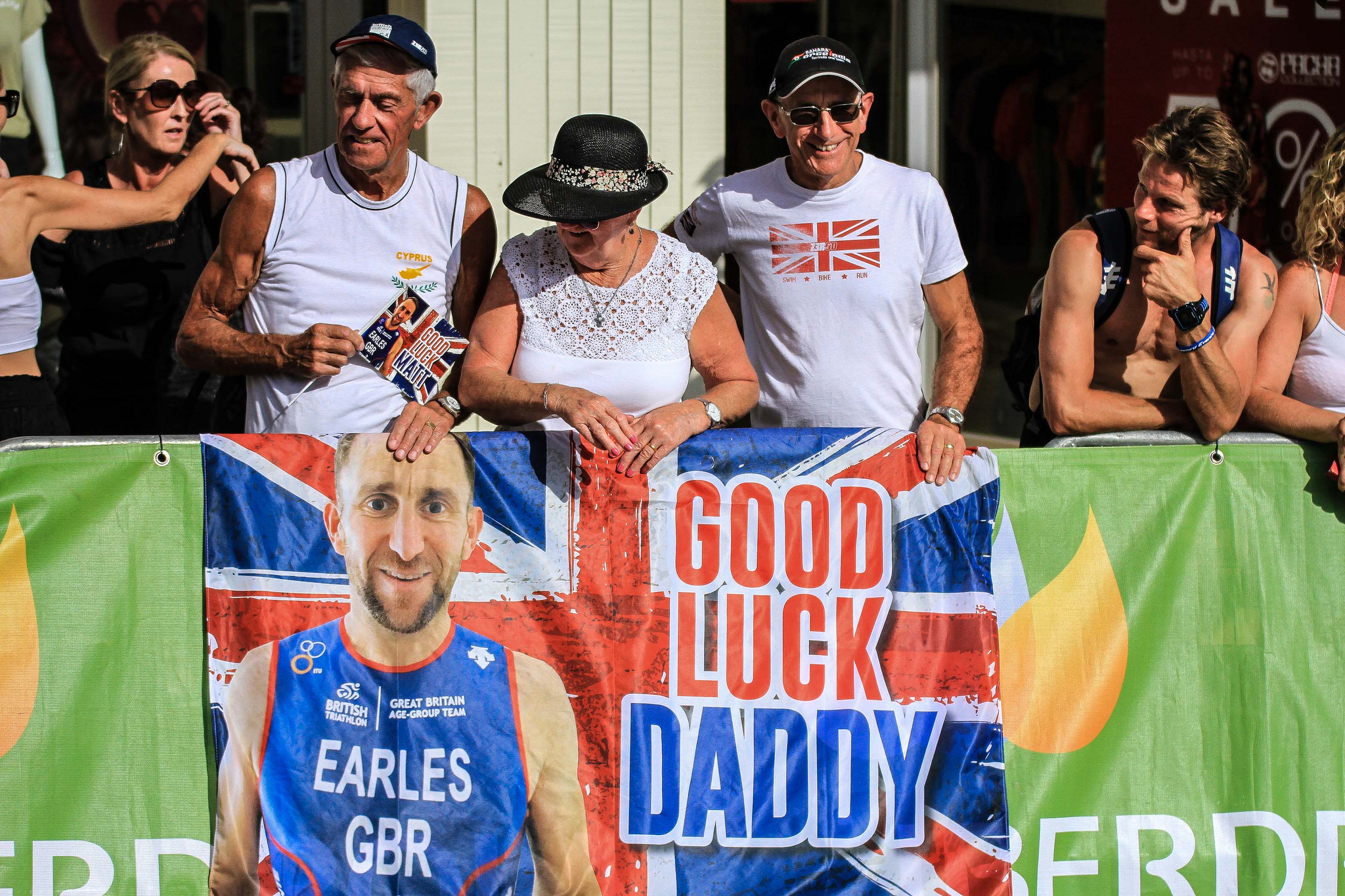
Age Group participation does not fund the elite; that is an old story and now widely regarded as a defunct argument. Age-Group participation does, however, support and grow the sport in the home nations and as we see from the increasing numbers of athletes at international events and as we see more and more uniformity in their team identity, we know that the “British Model” is one that is being looked at, adapted, improved upon and used to drive the sport forwards across Europe. Just look at the advancement of the Age Group teams from Austria, Norway, Germany, Italy, Romania, Switzerland and Russia. With support from the ETU Development programme in 2019, we can also expect to see more participation from Slovenia.
Jess Rose Williams, GB, sums it up, “The best thing about sport….. is not what you achieve….. it’s the people you meet along the way…..”
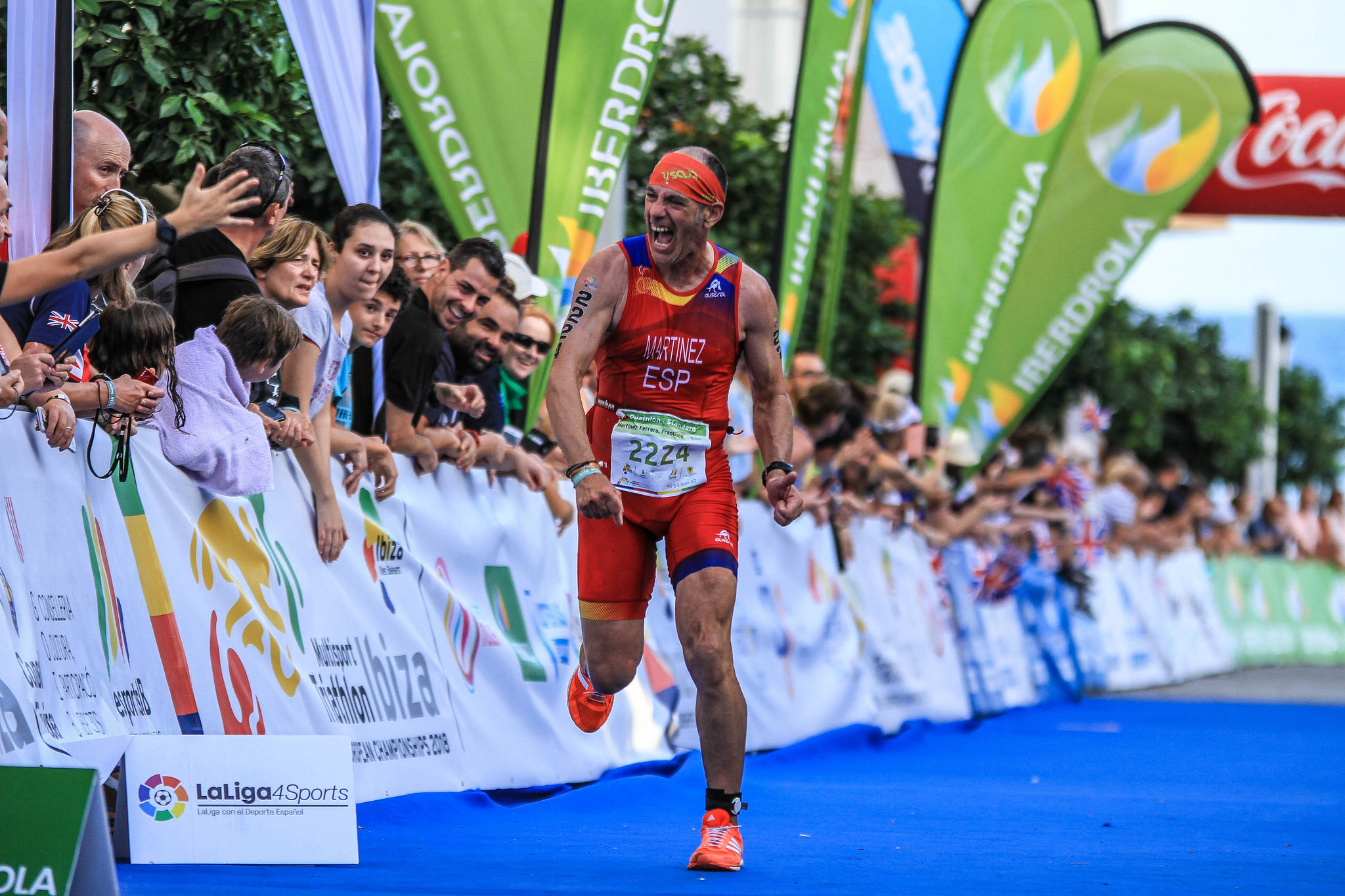
So, amongst the athletes who made such an impression on the island in sometimes quite challenging conditions, who came home with the golds?
| Gold | Silver | Bronze | ||
| GBR |
 |
10 | 14 | 15 |
| ESP |
 |
5 | 3 | |
| FRA |
 |
4 | 2 | |
| ITA |
 |
2 | 2 | |
| IRL |
 |
1 | 2 | |
| SUI |
 |
1 | ||
| GER |
 |
1 | 1 | |
| DEN |
 |
1 |
Winning your age-group is one thing; winning the race is moving into another dimension. That glory went to both male and female athletes in the 35-39 category, with medals being proudly worn by British and French athletes.
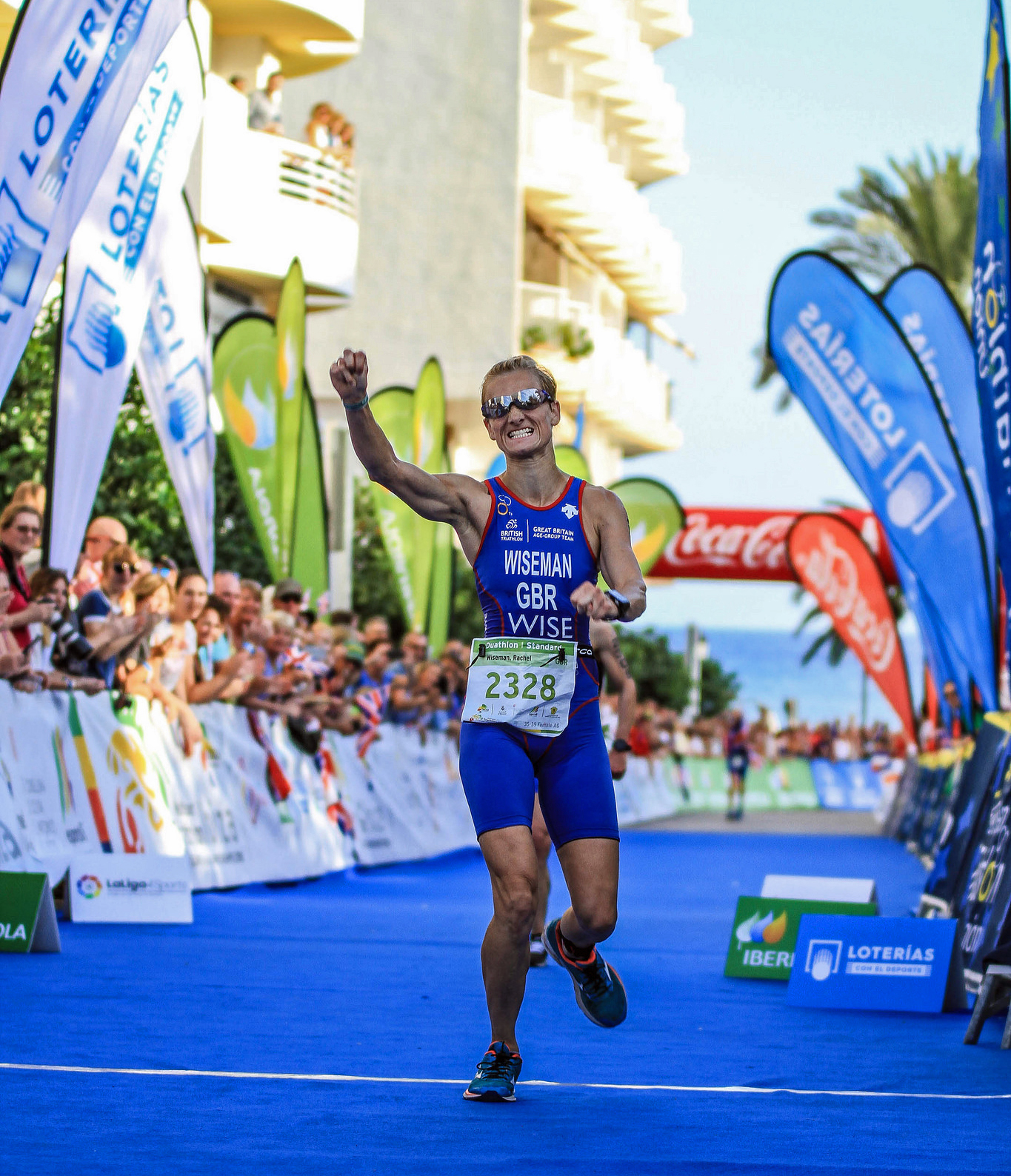
It was Rachel Wiseman, who posted the fastest individual time once again, having dominated the race in Soria last year. With a resounding victory in Fyn, the defending champion came to Ibiza as race favourite and battled all the way down to the line against a younger athlete, Marie Faithfull, beating her in a thrilling sprint to the line by just one second. Wiseman collects medals in triathlon too, with a silver this year in Tartu.
In the men’s category, it was Frenchman Alexandre Blain who posted the fastest finish time in his first venture out onto the ETU circuit.
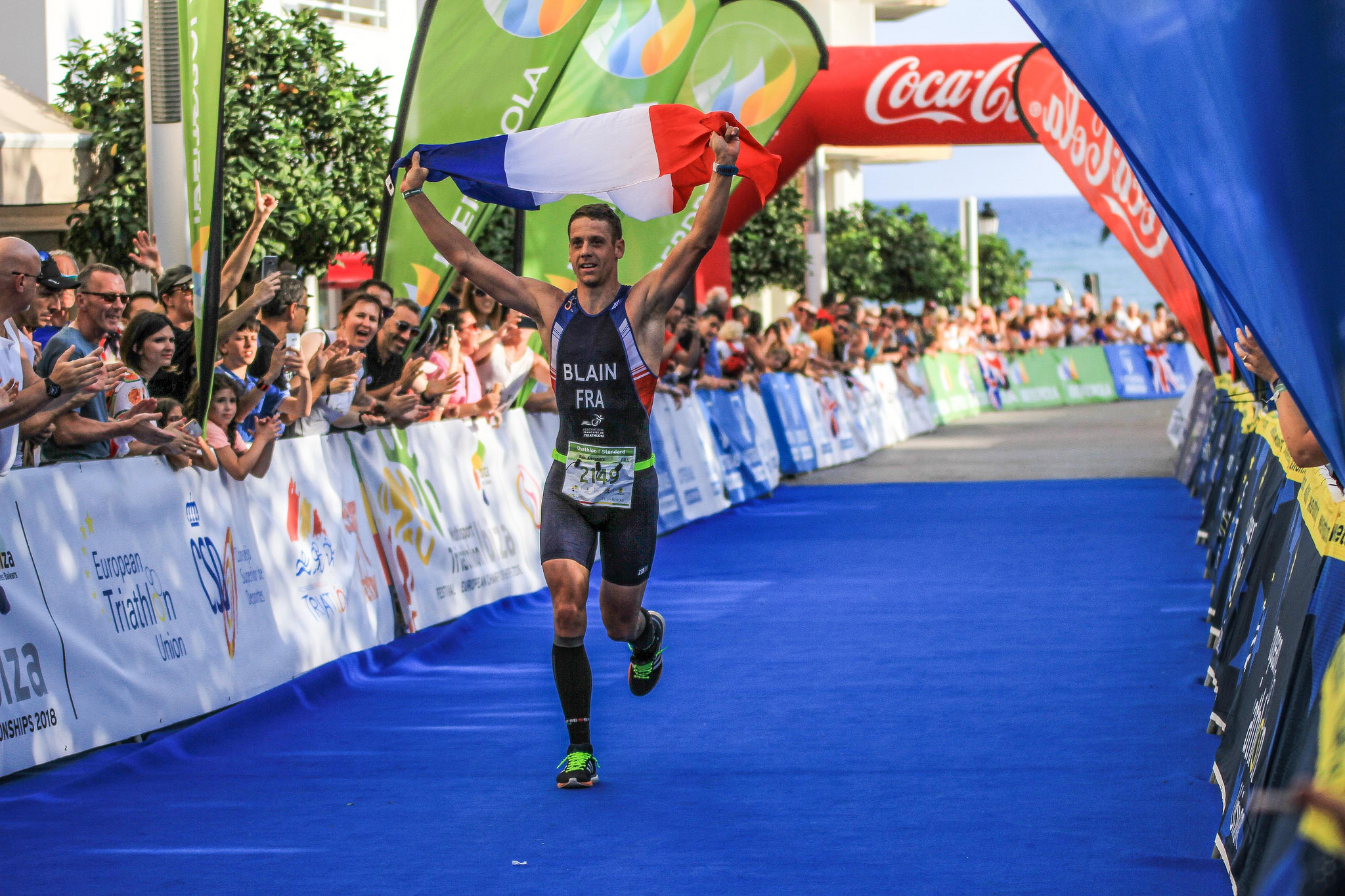
Coming to our sport from a biking background, he posted the fastest bike split of 46:38, to storm ahead and take gold. “Victoire aux Championnats d’Europe de duathlon amateurs. Première vraie expérience en duathlon standard AG (no drafting) et une première réussie (…) fier de franchir la ligne vainqueur overall avec le maillot bleu blanc rouge…”
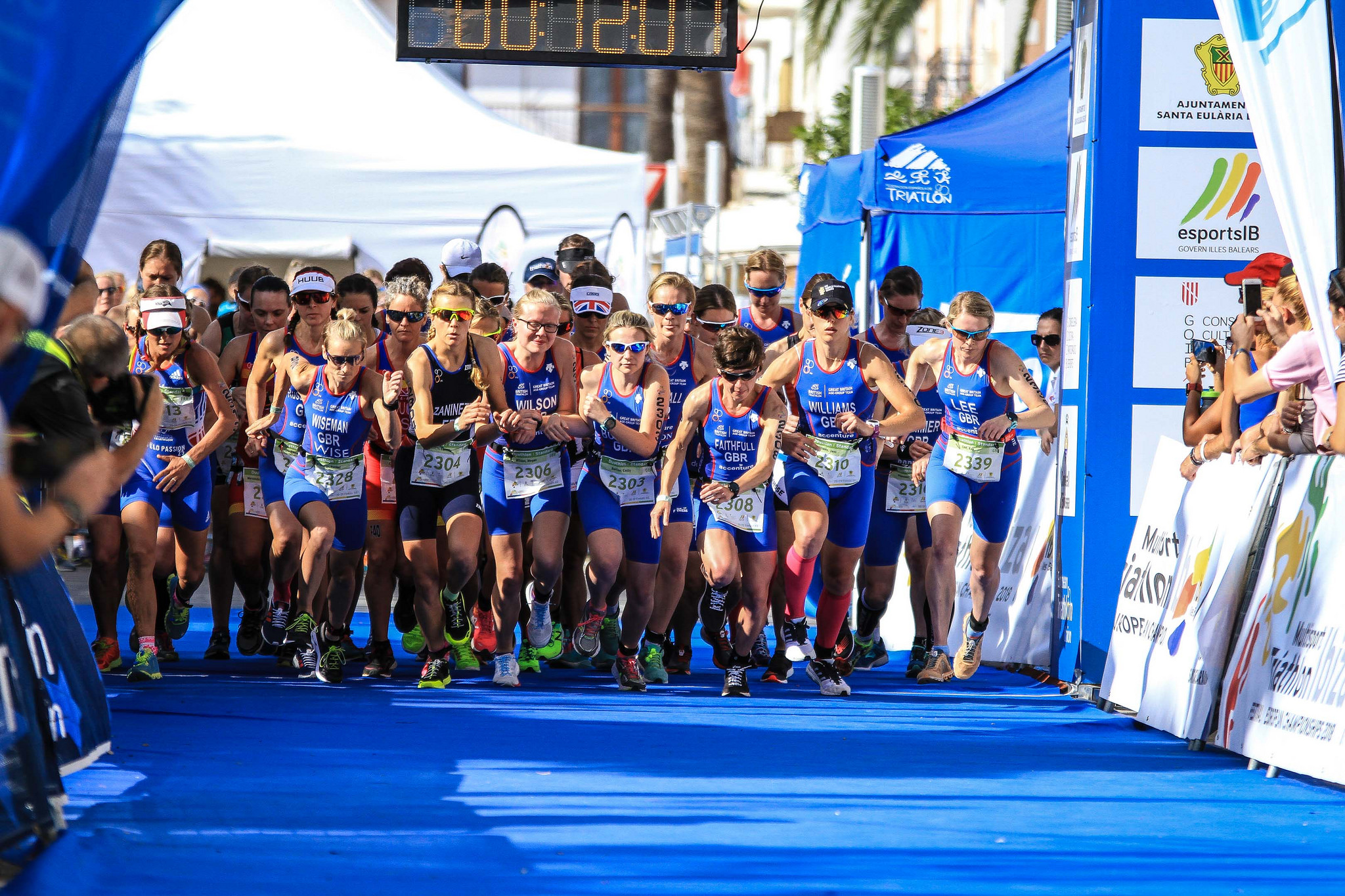
It’s not just blistering speed that can win you medals. Despite hosting the championships, for some inexplicable reason, the host nation did not field anyone for the youngest category. Not one male or female athlete wearing the Spanish uniform was present and this allowed Great Britain’s Emily Burton to add to her collection of titles. The young British athlete has had a truly remarkable run of success, winning her first European title in Soria last year. That was enough to whet her appetite and she doubled the gold with the World title in Penticton. Her bronze in Fyn was upgraded to gold in Ibiza and she stayed on to collect her 4th title with victory in the Aquabike.
France was celebrating the victory of Yohan Le Berre, who just held off Benjamin Choquert, to deliver gold and silver in the Elite race and the jubilation continued with Camilla Zaninetti convincingly beating Britain’s Megan Wilson. Both athletes feature for the first time on the ETU circuit and we look forwards to seeing them race again next year. For Zaninetti, the race was good preparation for the longer distance events she is planning but also gave her the chance for that special picture with the European Champion.
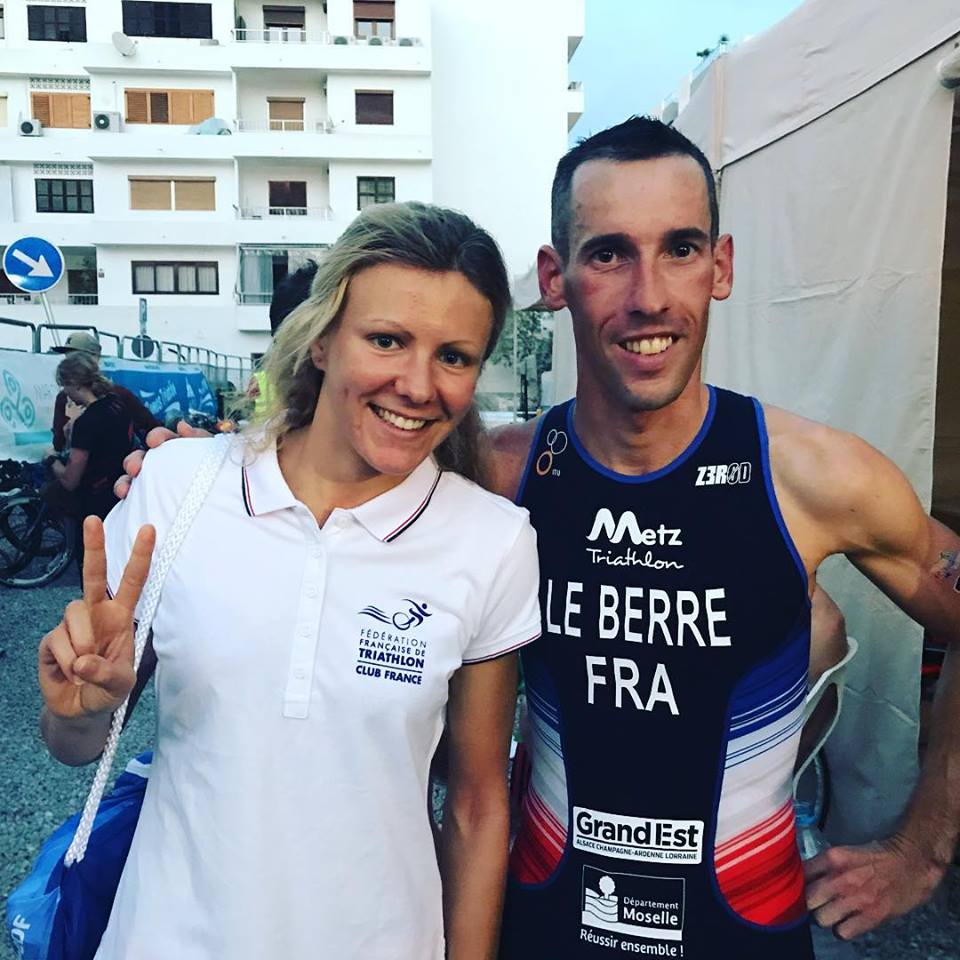
The men’s race was won by Juan Francisco Fernández Abril. With Jordan Lockett and Riley Richardson, racing for Team GB, the Spaniard was just too strong. Racing for the first time, he definitely gave success the “thumbs up”! He plans now to race at the Worlds in April in Pontevedra. For Lockett, this result is a clear sign that his early season injury is now sorted and this silver is added to his 2016 runner-up medal from Aviles. Richardson was unable to secure a second international silver to go with his 2nd place medal from Fyn but nevertheless beat off the attack on two wheels form his teammate, Jacob Anderson to claim the bronze.
Marie Faithfull lost out by one second in an amazing sprint finish. She ran pace for pace with Rachel Wiseman, lost a few paces in T1, caught up on the bike, lost a few paces again in T2 and then ran her heart out to post the fastest run split of all the medal-winners.
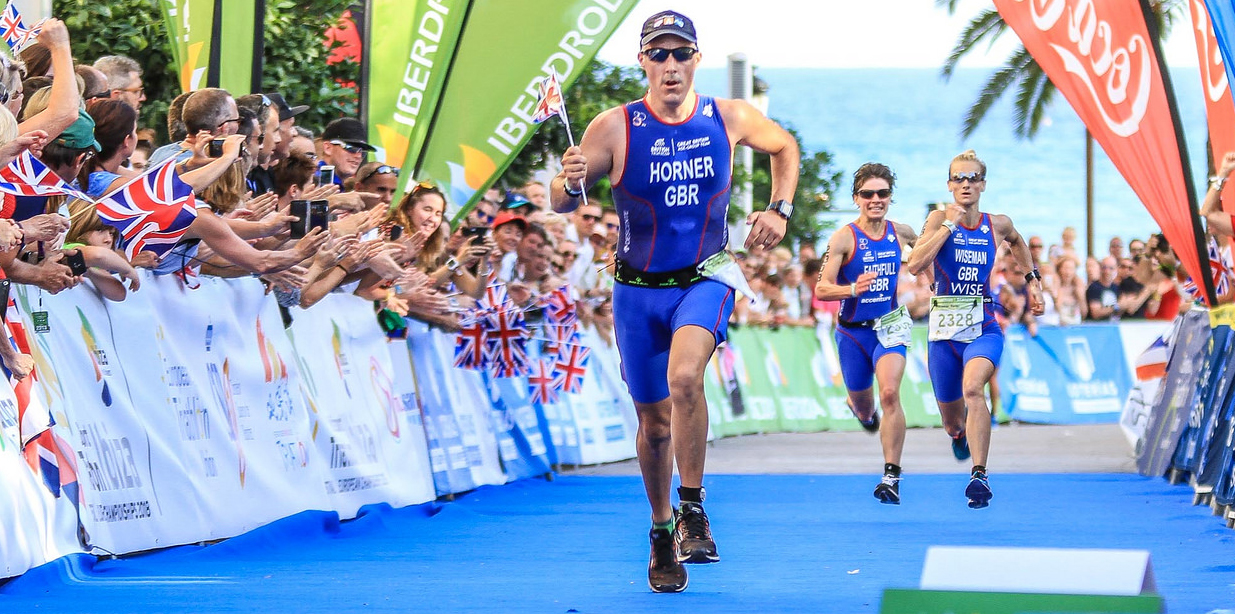
For a debut race, this is an impressive performance for a debut at international level. Faithfull’s performance left the others in her category wondering what had been unleashed. A lead of over 8 minutes, with domination in all three disciplines (including transition, of course) she was nevertheless joined on the podium by fellow Brits, Jess Williams, who matches her Aviles silver and adds to her Fyn bronze and Rebecca Pidgeon to make it an all-British podium.
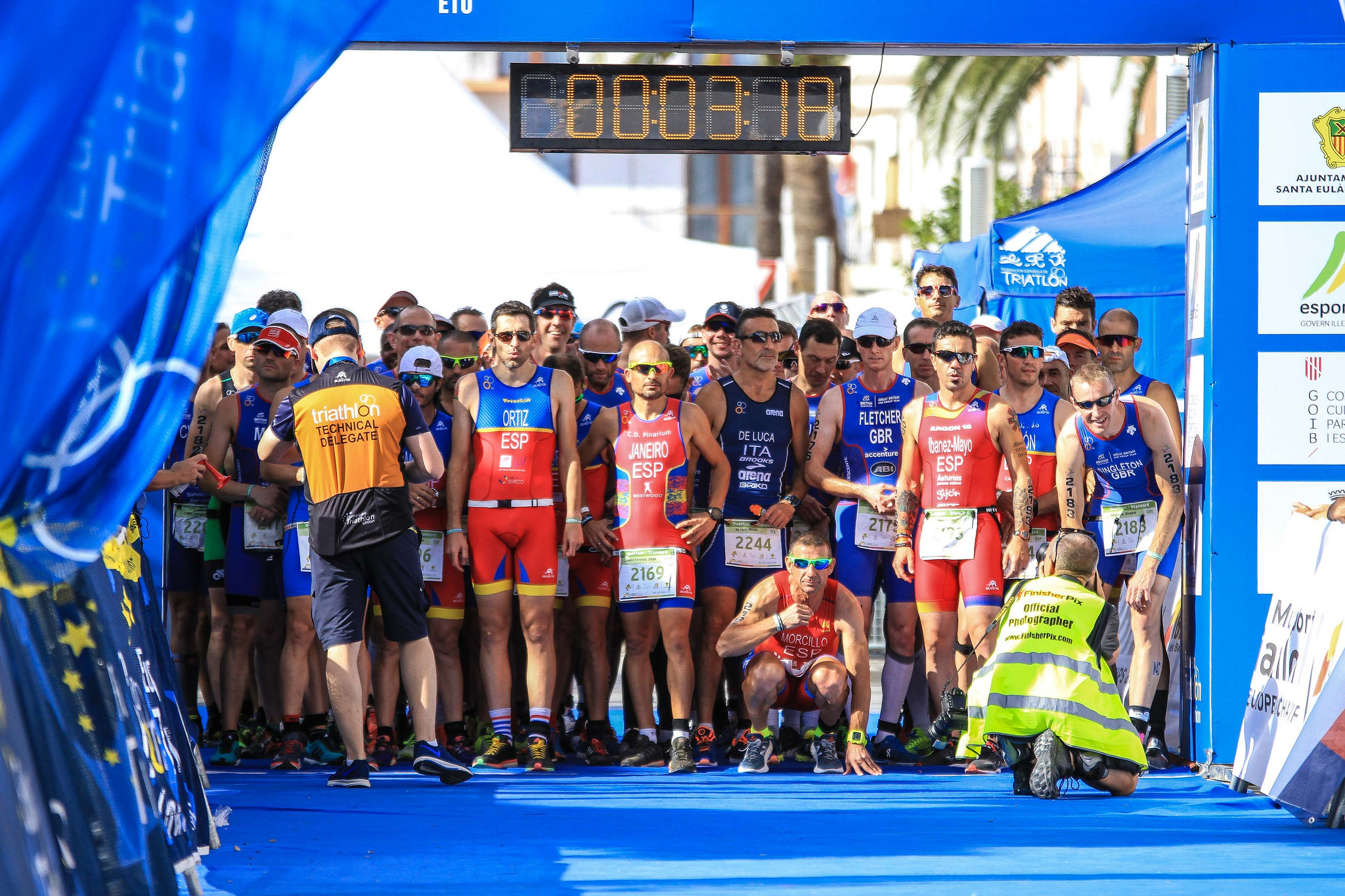
The men’s category was a closer race but one that was dominated by the Spanish. An opening run of 34:28 saw Joan Ferrer Roig split the field. He lost valuable time in T1 and looked to have lost out on the bike as other athletes powered their way forwards but his closing run of 17:37 saw off the challenges and gave him a comfortable gold. Teammate, Sebastià Mascaro Rigo was the strongest of the podium athletes out on the bike course and did enough to secure silver ahead of Britain’s Dean Clarke whose bronze here was a great improvement on his 9th place in Fyn.
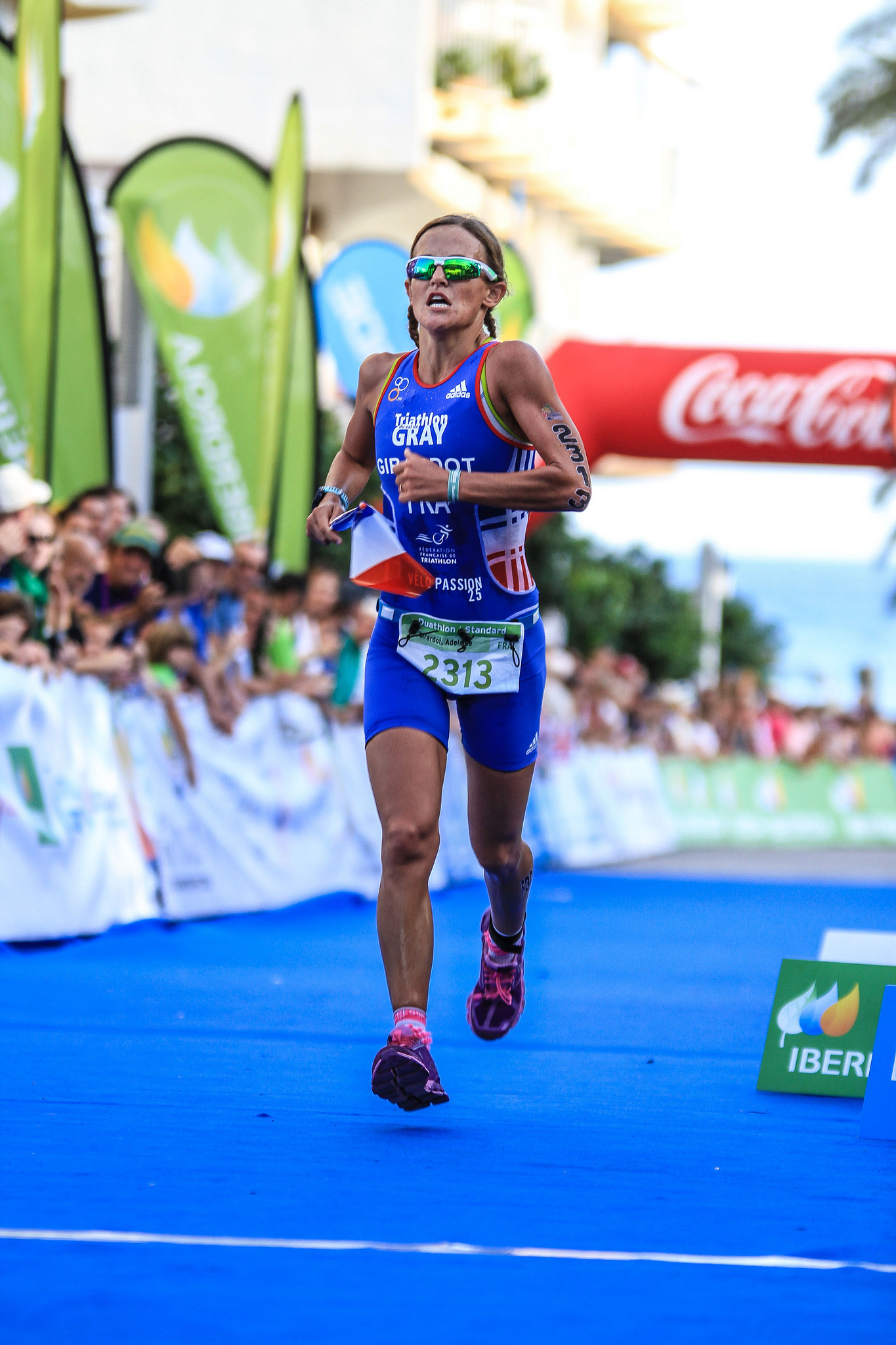
In the 30-34 category, we were treated to a great mix of nationalities on the podium, with gold going to France’s Adélaide Girardot. A powerful long distance triathlete and having raced elite over the sprint distance, her opening run was to set the tone for the race, with complete domination in each run segment, on the bike and in transition. Silver and bronze went to Great Britain, with silver going to Gemma Brierley-Rutter and bronze to Joanna Plimmer.
Runner-up in Fyn, it was Umberto Baracchi who came to the race with the expectation of a medal and from the very start, set the pace with a breath-taking 33:07 for the first 10k. A powerful bike leg secured him victory but behind him there was a battle between Britain and Ireland with Jonathan Peters just finding enough in the final run to edge Raymond Lonergan into the bronze medal position.
As we saw above, it was the 35-39 category that saw the fastest performances of the day, with Rachel Wiseman winning her age-group by over 6 minutes. It was a British clean-sweep, with silver going to Leah Walland and bronze to Lindsay Russell-Smith in what was an entirely British category (yes, only British athletes on the start line in this Age-Group). Walland has quite a collection of medals now; starting off with the bronze in Soria last year, added to with the bronze in Fyn, the title in Tartu and now, with the silver, her range of European medals is complete and her future looks bright. For Russell-Smith, the result is a massive improvement on her Gold Coast race and signals clearly to the Brits that at the top end of this age-group there is some real pace and talent.
Amongst the men, the title went to Frenchman, Alexandre Blain, whose power on the bike was unmatched. The race was led early on by some impressive running from Nathaniel Walker, whose opening 10k was clocked at 33:31. Walker was runner-up last year and had every expectation to take the title in 2018 but once the bike leg was underway that dream was pushed to the side. Thirty seconds behind him on the run was teammate, Richard Shephard, 2014 World Champion and runner up in the Worlds last year. He more than made up the lost time on the opening 10k with a strong ride to take him into the silver medal position and that is where he stayed up to the line, to finish ahead of Walker, despite having a slower final 5k.

In the 40-44 category, neither the British women nor men collected any medals. It was the only category in the race where Team GB did not feature. Instead, it was a powerful Swiss team that collected both gold and bronze, with Katrin Saly Graf dropping down from Long-Distance duathlon (9th place in the Elite category) to maintain her power on the final run. As the race opened, she was joined on the 10k by the 2014 World Champion, Eva Ribalta Ferrer ESP. Having won bronze in Soria, Ribalta was certainly hoping to improve and exchange that medal for gold or silver but the power of Saly on the bike proved too much and she had to settle for silver. Behind her came Jacqueline Uebelhart. Runner up last year, the Swiss athlete mixes and matches her distances, having claimed silver in Copenhagen in 2016 in the ETU Powerman Championships. She looked to be a threat out on the bike but her final run pace dropped and she was unable to catch Ribalta.
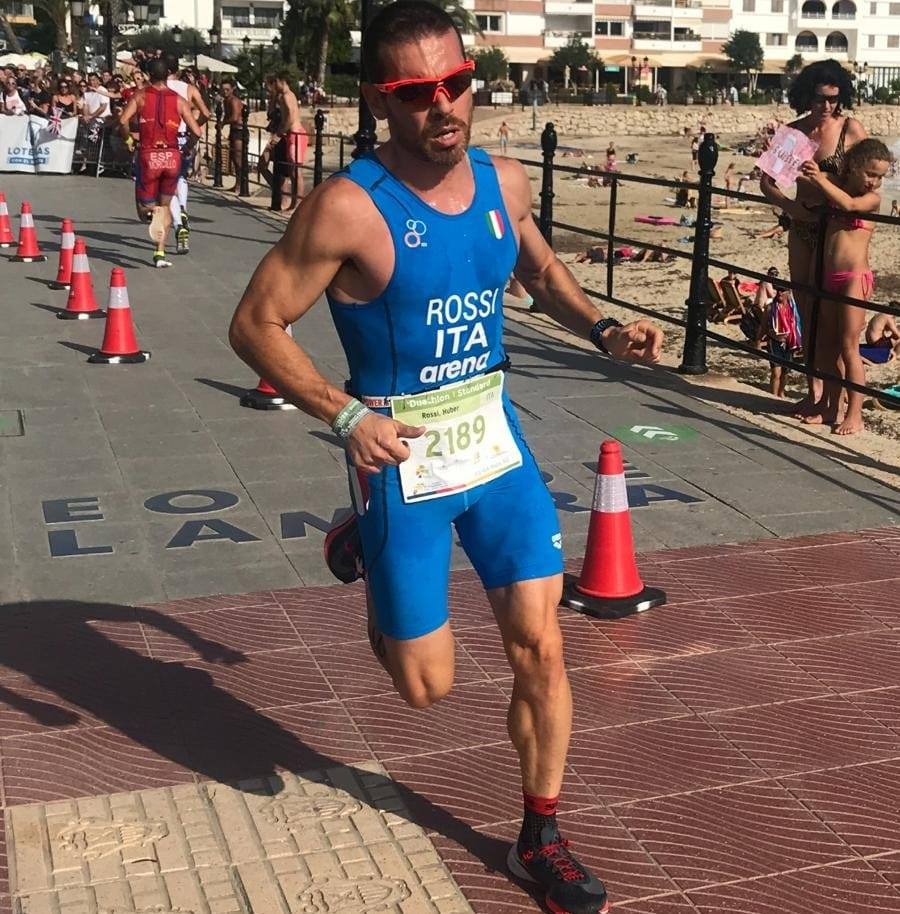
For the men, the glory was shared between three nations. It was Italy’s Huber Rosssi who scored gold in both Standard and Sprint distances to not only become the double European Champion but also to walk away with a spectacular trophy for being the best duathlete in Lombardy. His winning margin of over 6 minutes, sets him out as being the man to watch next year, when he returns to defend his titles in Romania. “Aspettavo questa gara da tempo (dalla foratura ai mondiali in Danimarca) e finalmente è arrivata la doppietta!!! Non credevo di avere energie dopo la distanza sprint di ieri ma per fortuna sono bastate anche oggi nella distanza classica, qualcuno mi ha detto che quest’isola ha un certo magnetismo, forse ha aiutato… Quando ti prepari per un evento con metodo sai che puoi controllare molti eventi ma non tutti (ma per quelli abbiamo avuto un bel team di supporto) e tanti amici al seguito. Adesso qualche giorno di riposo e poi cerchiamo di finire la stagione nel migliore dei modi. / I’ve been waiting for this race for a long time (from the puncture in the Worlds in Denmark) and finally I did the double!!! I didn’t think I had anything left in the tank after yesterday’s sprint distance but luckily there was enough today for the standard distance, somehow this Island has a certain magnetism, maybe it helped… When you prepare for an event with method you know you can control many things but not all (but for those we had a nice support team) and many friends to follow you. Now a few days of rest and then we try to finish the season in the best way.” Silver went to Francisco José Silva López ESP and for Ireland, their first medal won only a few minutes before, matched the bronze with Ciaran Steed making a welcome return to the international circuit.
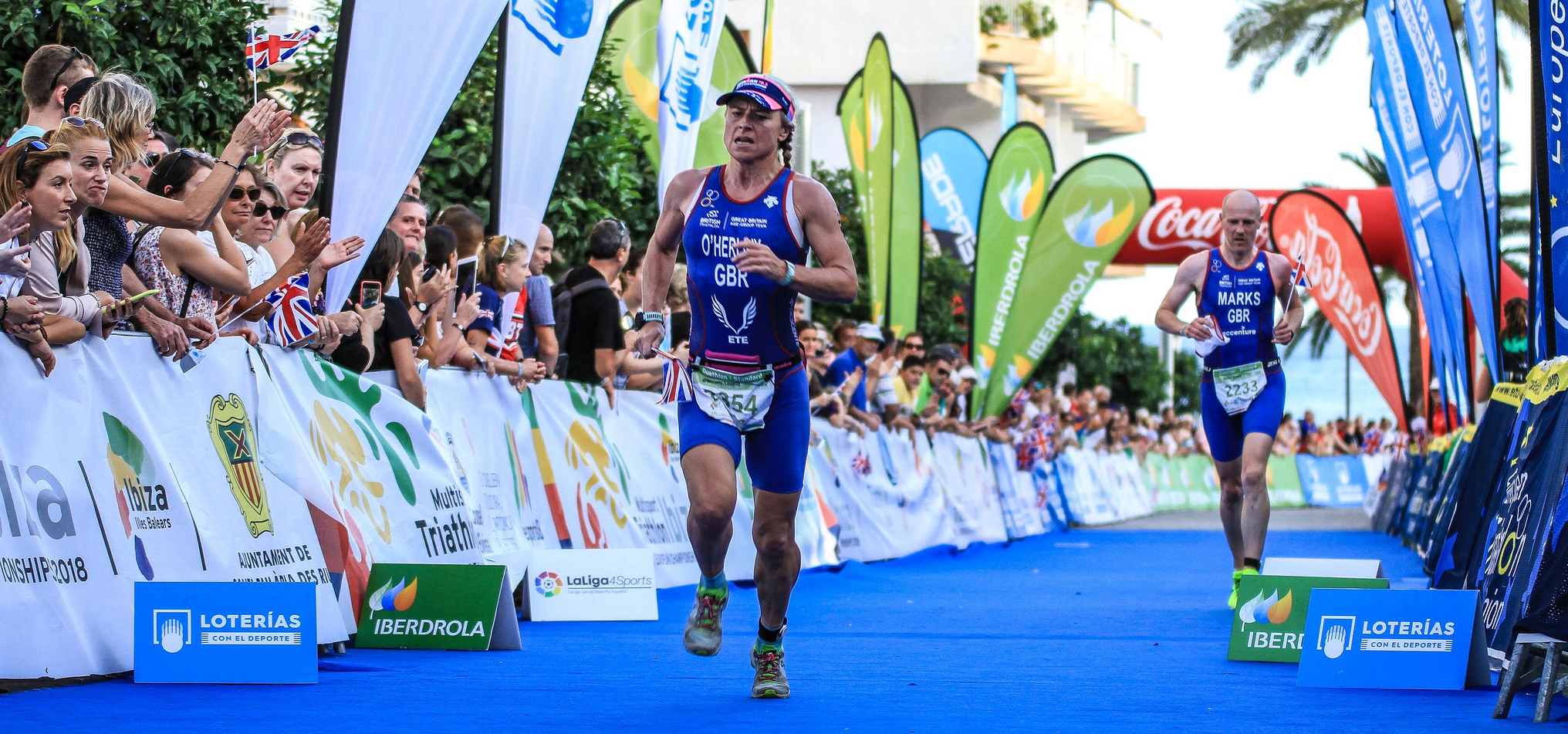
Moving up through the age-groups and the Brits started to collect more and more medals. In the 45-49 category, it was again a clean sweep for the women, with Sharon Walker, Louella O’Herlihy and Katherine O’Hara on the podium. For defending champion O’Hara, it was a race lost on the bike. For O’Herlihy, losing out on the first run, she caught up with Walker on the bike but then lost out to the superior running of Walker, holding on to silver.
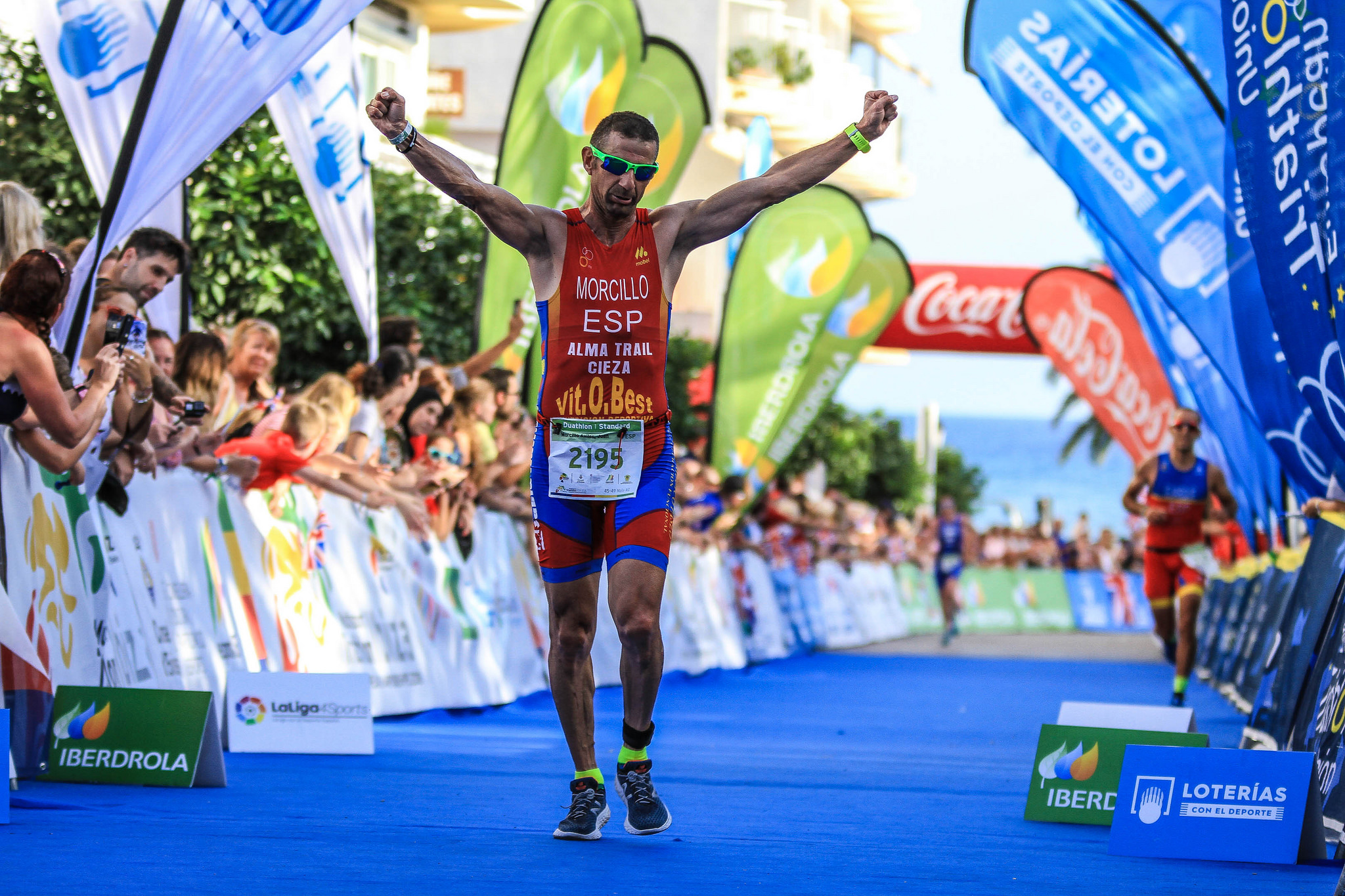
The men’s race saw Britain’s Paul Robson come close to beating Spain’s Juan Morcillo Aviles. Morcillo, 2015 European champion, runner up in the 2016 Worlds and bronze medal winner last year in Soria, was unable to match the power of “Rocker” Robson, who put in a blinding bike split but having that extra pace on the first run, he was able to maintain the advantage despite a determined effort from Robson on the final 5k, to come home just 16 seconds ahead of the British athlete. Bronze went to Chris Nicoll, to add to his collection of bronzes from Ottawa, Copenhagen and Aviles. Back in 2015, he was runner-up in Adelaide, at the start of his age-group, perhaps 2019 will see him head higher up the podium.
Germany joined Great Britain on the podium in the next category, winning silver in the women’s 50-54 age-group. Nicola Miller ran cautiously for the first 10k and used this first leg to check out the opposition. Once out onto the bike, she put the clappers down and established a commanding lead that gave her the chance to ease off for the final run. No doubt Taunton Scholl will be delighted to see the gold medal, won by their Chief Operating Officer. Crossing the line with a 2-minute lead, she greatly improved upon her 2017 bronze. In silver medal position, it was Diana Mull who earlier this year won bronze over the tougher ETU Powerman distance in Denmark. She would later use her biking skills to claim a second silver in the Cross Duathlon Championships on the island. Bronze went to Jayne Baldwin.
For the men, it was again a British victory, with Ian Reid crossing the line comfortably ahead of Italy’s Nicola De Luca. Dave Smith rounded off the podium. Reid came to the event as runner-up from Fyn. That was over the sprint distance and he was beaten by an Italian. Coming into T1 some distance behind the race leader, De Luca, he soon made up those lost seconds and some, as he posted the fastest bike split of the age-group. Coming into T2, he had almost three minutes on the chasing Italian and was able to ease off the pace to collect his European title. De Luca cruised home to silver, with Smith once again collecting the bronze, which he adds to his 2017 medal.
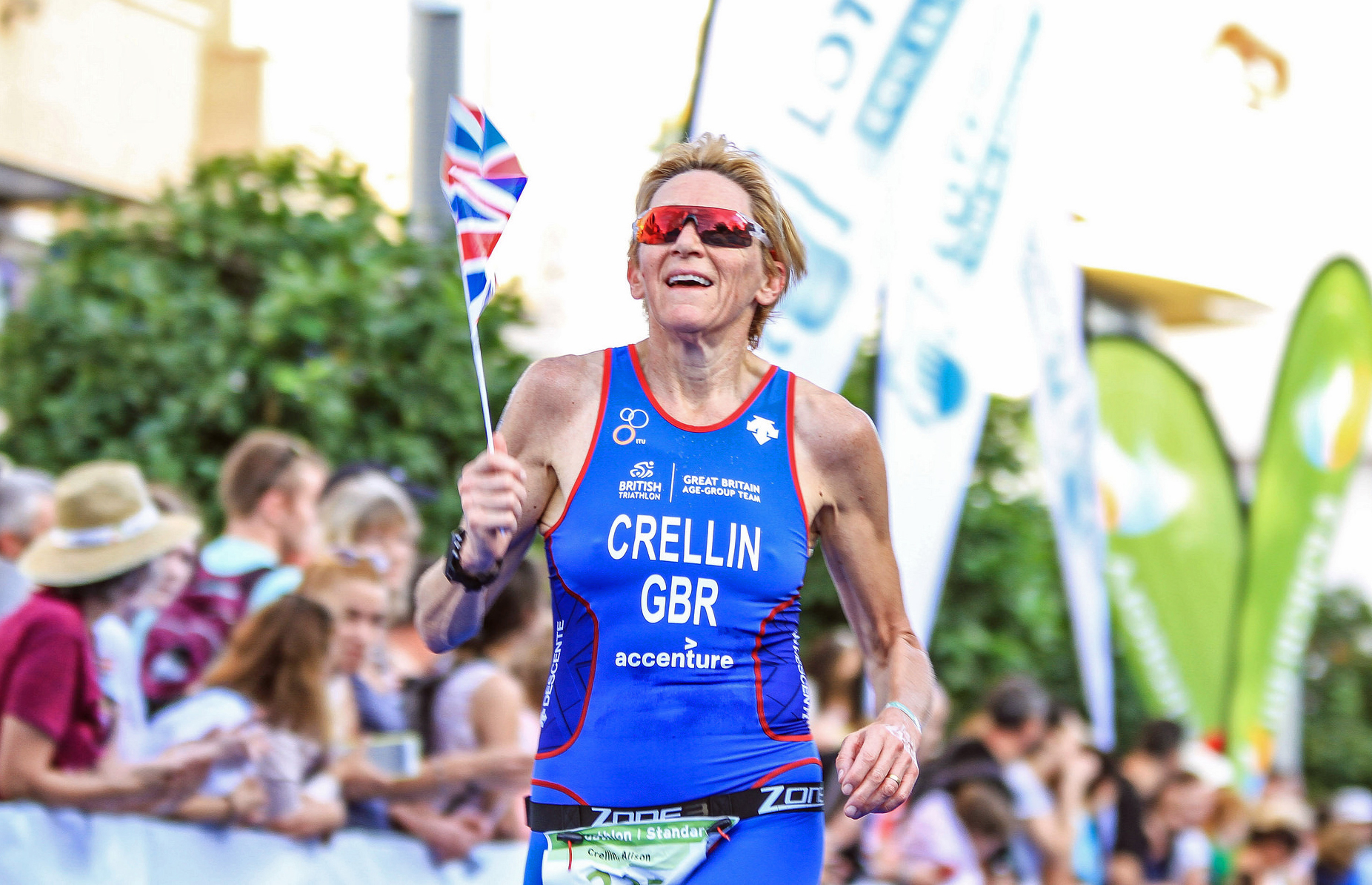
Alison Crellin GBR came to Ibiza as World Champion. Confident and powerful, she dominated the race to add the European title to her collection and crossed the line with ease. She was to repeat her performance later in the week over the middle distance and returned home clutching two gold medals. Marinella Sciuccati had won the Sprint title but could not match Crellin. Settling for silver she was ahead of Germany’s Susanne Apfel, who later went on to win silver in the Cross Duathlon. The host nation was delighted to see Manuel González Ojea, their defending champion, add gold to the bronze he won in the sprint. He went on to win silver in the Cross Duathlon and looking back to his international performances, he has been on the podium for each of his duathlon races.
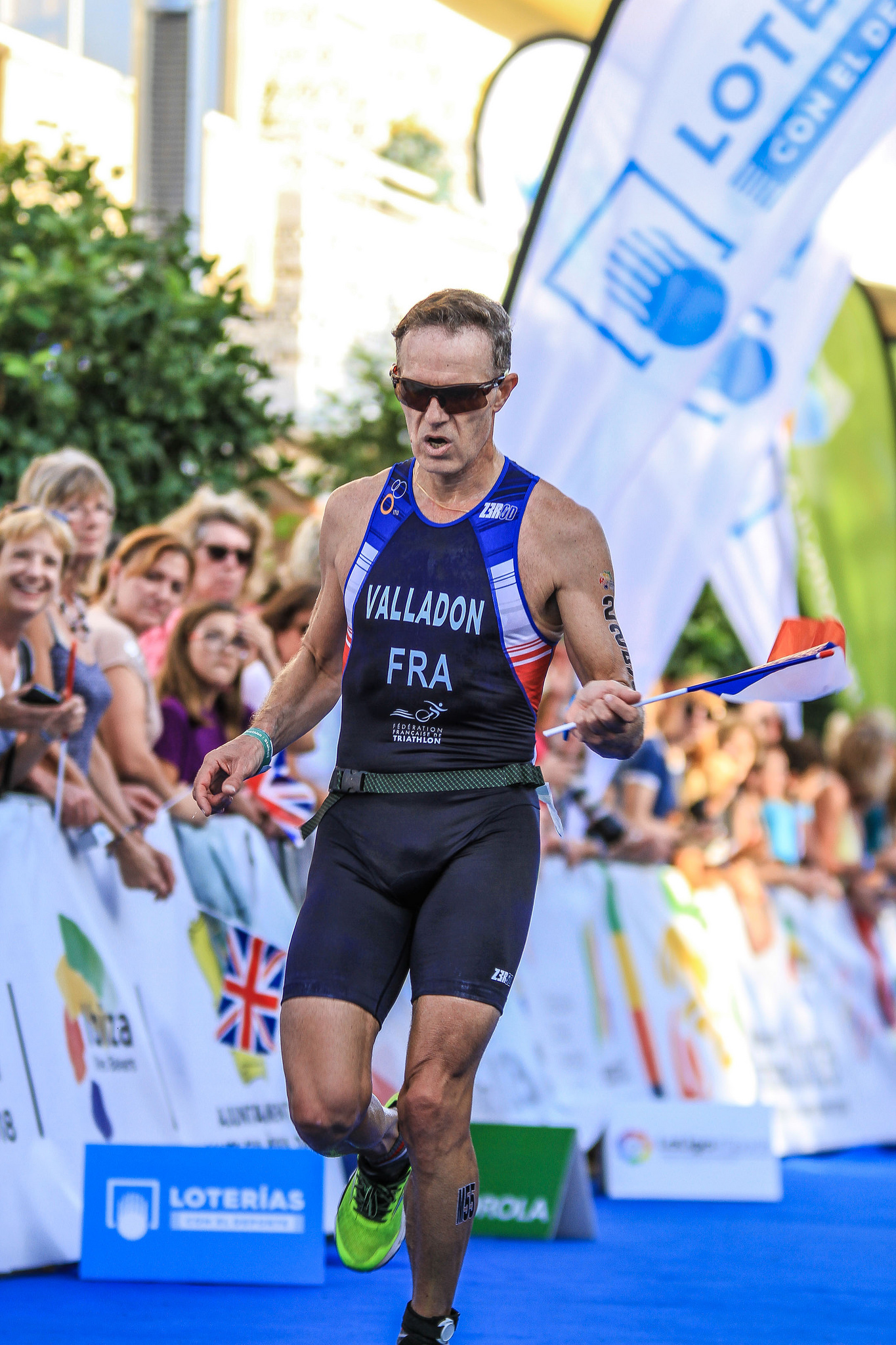
France claimed its fourth medal with Didier Valladon. With the ETU Powerman title under his belt, Ian Cardy dropped a distance in Fyn to claim silver. Ibiza gave him bronze. With some doubt as to whether he would race, he decided, cold or no cold he would be on the start line. “After suffering with the “Cardy Cold” for the past week I wasn’t sure how it was going to go out in Ibiza for the European Duathlon Champs. But really pleased and proud to have finished the race with the Bronze Medal! It was a tough race in 28c heat and I suffered on the second run with cramp. That’s the end of a really long season which has totally eclipsed my goals and expectations and now time to start the off season and think about next year. Thanks must go out to my number one supporter Heidi for always being there, you can’t do this without the support of your family.”
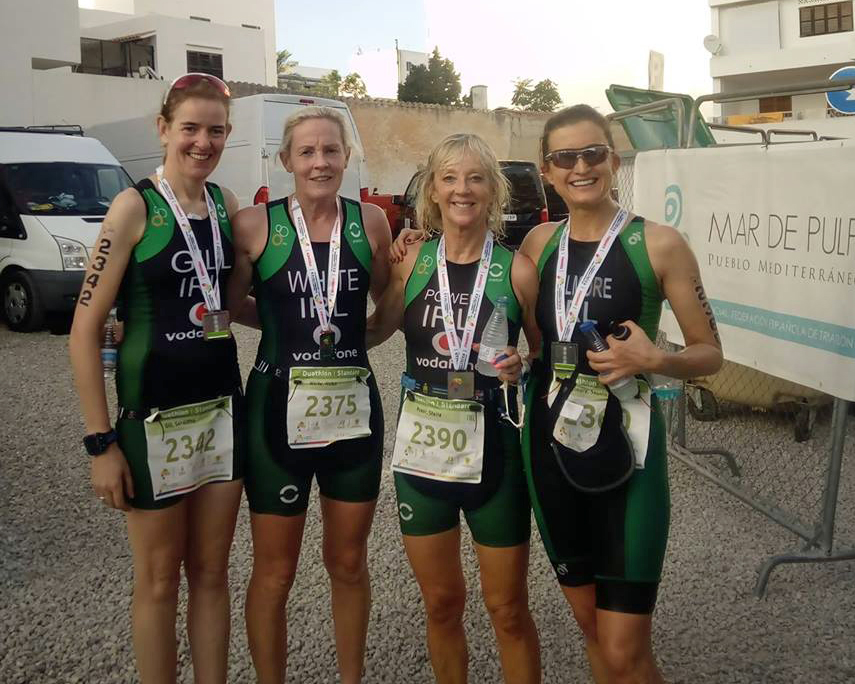
In the 60-64 category, the top place on the podium was occupied by Sheila Power IRL. She came to the event as defending champion and also with a world bronze from 2017. She missed Fyn but on paper was clearly the one to beat. Initially, it was GBR’s Irene Peaty who held the Irish athlete in her sights, but Peaty lost valuable time in T1 and then out on the bike, allowing fellow Brit, Christine Meek to edge into the silver medal position.
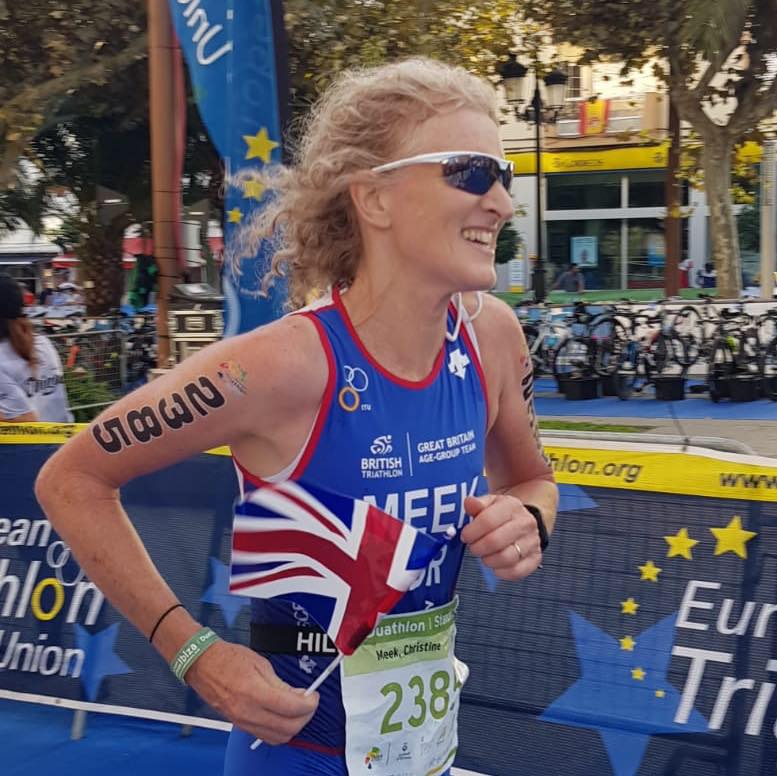
Meek’s bronze in Fyn showed that she was on form and as the race went on she seemed to get stronger and stronger. Peaty, bronze medal-winner in Vejle this year, was dropped but Meek could not match the power of, well, Power and it was gold to Ireland. Meek went on to take the silver in the Aquathlon. Power’s season went from strength to strength and we can expect to see her going for a big one in Nice next year. Her philosophy was simple, “Had no expectations other than participating with my Triathlon Ireland fellow athletes.” There was no stopping Spain’s Bernardo Jareño Rodriguez in the men’s category. He ran away from the very start and had a solid lead entering T1. Struggling with his kit he lost that advantage and followed Britain’s Nigel Arnold out onto the bike course. Soon enough the Spaniard was back in the lead, to the delight of the crowds around the course who were not British and he came into T2 in command. A far better T2 saw him run out a clear leader and he held that lead for the final 5k to claim the title. Behind him, Arnold was having a magnificent debut on the international stage and his power on the bike and run saw him cross the finish line, taking silver, with an 8-minute lead over Rob Pearson, whose 4th place last year in Soria was upgraded in Ibiza to bring him the bronze. Loudest voice was from the victor’s family, “El meu pare Bernardo Jareño campió d’Europa de Duatló. Una gran recompensa a l’esforç, constància i superació. Tot un exemple. / My Father Bernardo Jareño European Champion, duathlon. A great reward for his hard work, perseverance and determination. An example to us all.”
The British women were denied a clean-sweep in the 65-69 category. Jane Holmes having a strong opening 10k run and finishing with pace. The 2016 World Champion missed Soria last year but came back with a vengeance in Fyn with a silver in the standard and a gold in the sprint. 2017 European and World champion, Elspeth Knott struggled on the opening run but once on two wheels, she was all power and battled through the field. Out on the final run she had done enough to hold off the challenge of Denmark’s Middle Distance European champion, Bonnie Ridderberg.
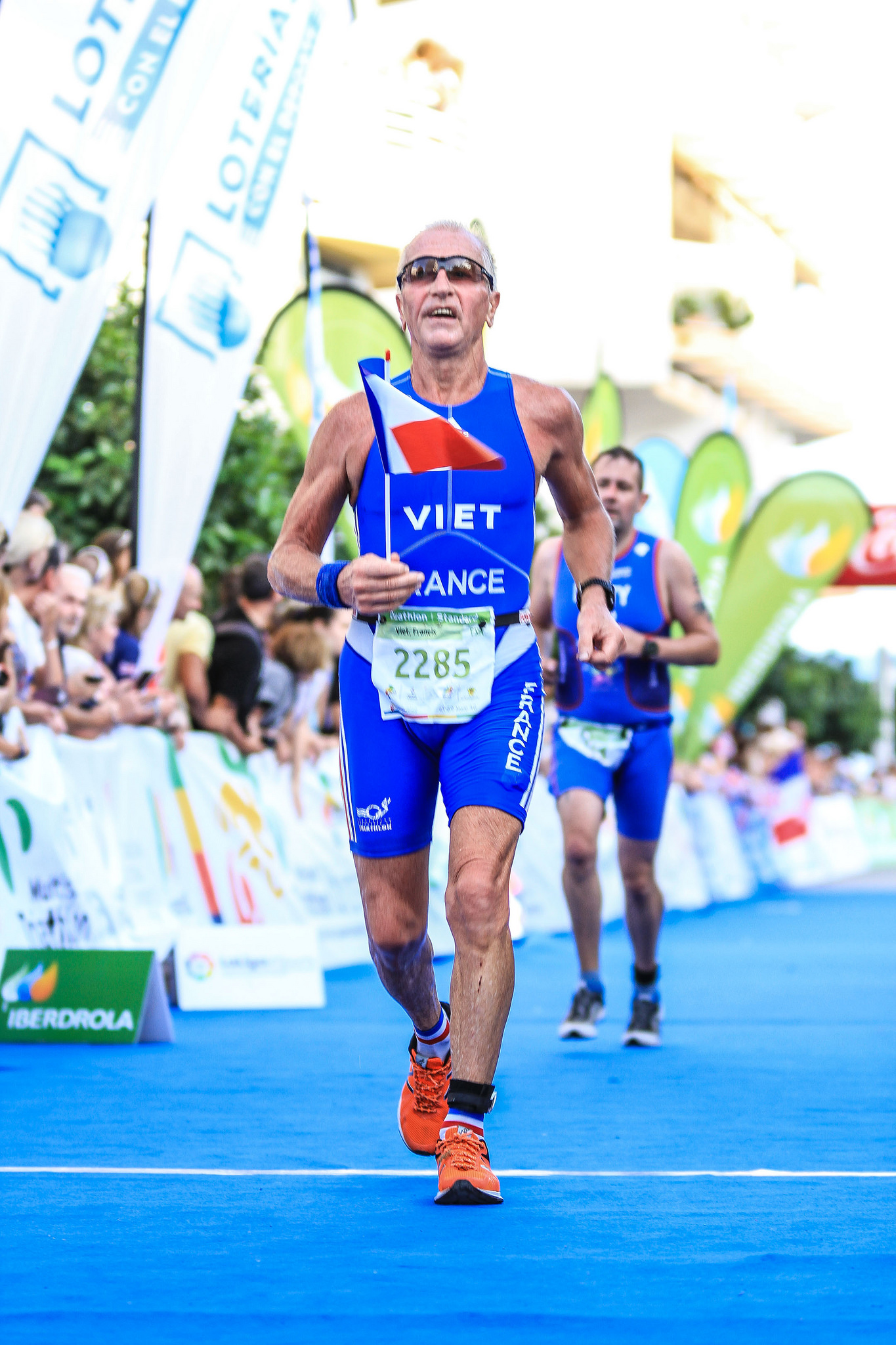
It was gold to France in the men’s race, with Francis Viet adding yet another title to his collection. The ETU champion in 2016 and 2017, ITU Powerman Champion in 2016, runner up in 2017, he was convincing on each segment. Britain’s Steven Rue, winner of bronze in Soria came close, with super-fast transition skills but the final run saw him lose the battle. Ashely Robinson joined him on the podium as Team GB scooped yet more medals.
Sadly, the older men were not joined by the women and in both the 70-74 and 75-79 categories, it was an all-male affair. Team GB made it a clean-sweep in the younger of the two categories, with Keith Walker leading Vernon Thomas and James Fell home.
In the final category, it was George Prodrick who claimed the title for GB, while Guy Daudet, defending champion, was runner-up for France. Both Prodrick and Fell race for PACTRAC Triathlon Club. The Peterborough-based club is naturally delighted at these impressive performances.
In the Sprint Distance, it was again Team GB that dominated and again it was in just one Age-Group category that the fastest times were posted.
| Gold | Silver | Bronze | ||
| GBR |
 |
14 | 17 | 18 |
| SUI |
 |
3 | 1 | |
| ITA |
 |
3 | ||
| ESP |
 |
2 | 7 | 4 |
| DEN |
 |
1 | ||
| HUN |
 |
1 | ||
| POR |
 |
1 | ||
| RUS |
 |
1 | ||
| GER |
 |
2 | 1 | |
| IRL |
 |
1 |
Overall winners were Sandrine Benz, SUI and Daniel Jenkin, GBR. Both raced in the 30-34 category. Benz is a powerful athlete, with the 2014 Sprint Triathlon ETU title, runner-up in Paguera over the Middle Distance and World Champion in Edmonton that year. She carried on collecting medals with the World title in 2015 in Chicago and in 2017 at the Auckland World Masters. Her debut as a duathlete on the international stage will surely see her return to defend her title in 2019. Jenkin, from Leeds but now based in Durham, his sponsors were delighted to see him cross the line ahead of anyone else. He adds this ETU title to his 2017 Kitzbühel win and 2018 Tartu victory. Not only is he now a triple European Champion but also the World Champion, following his victory in Fyn. What better way to advertise your product than this consistently high-performing athlete.
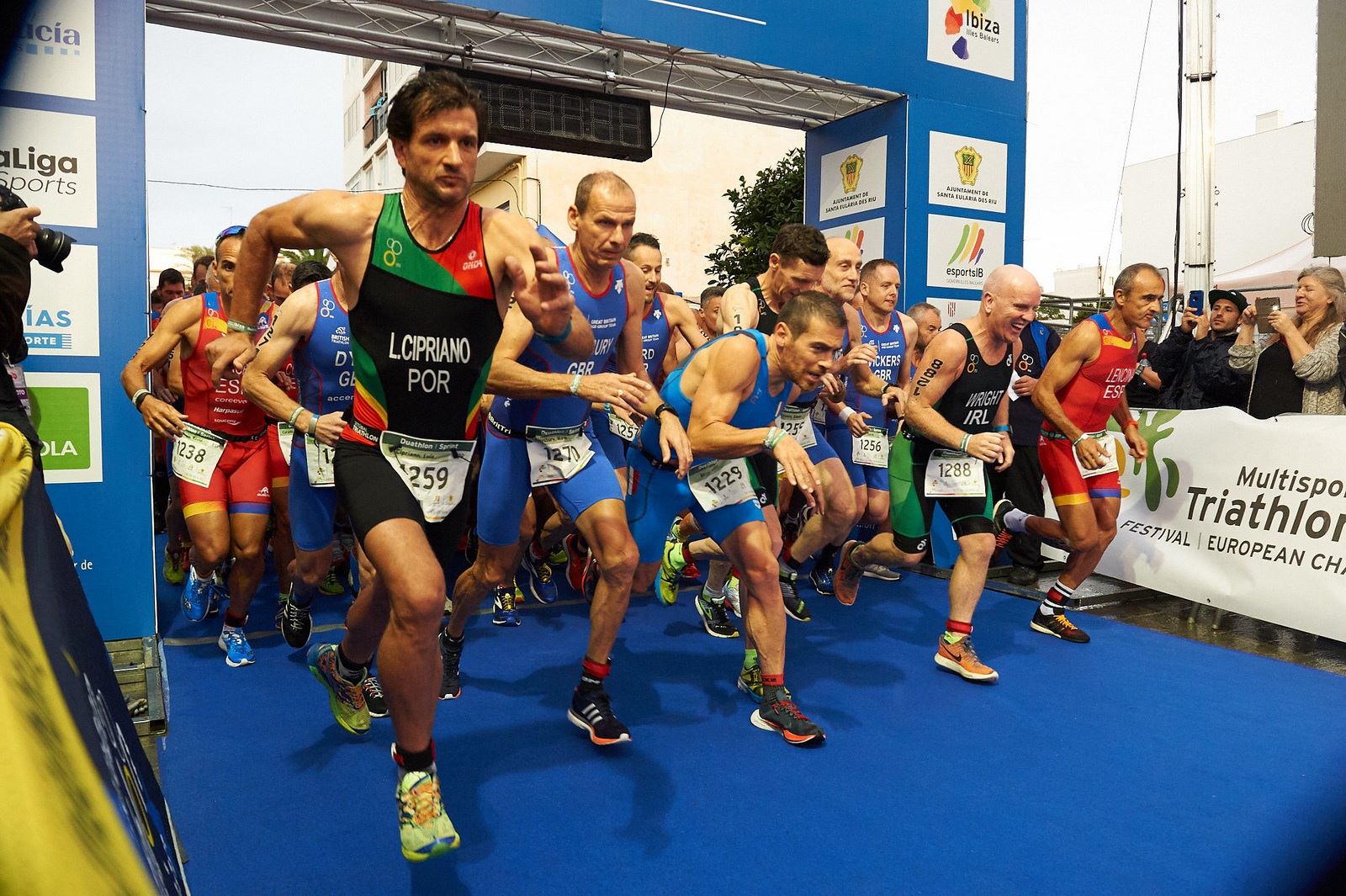
The race provided excitement across the board and quite a lot for the organisers to go away with as a result of several fundamental failures to deliver. What needed to be said at the time was indeed said, in a variety of languages and nobody involved with the delivery of the event cannot be unaware that the problems encountered must never be seen again. With all that behind us, the focus is sharper on those great performances from the athletes.
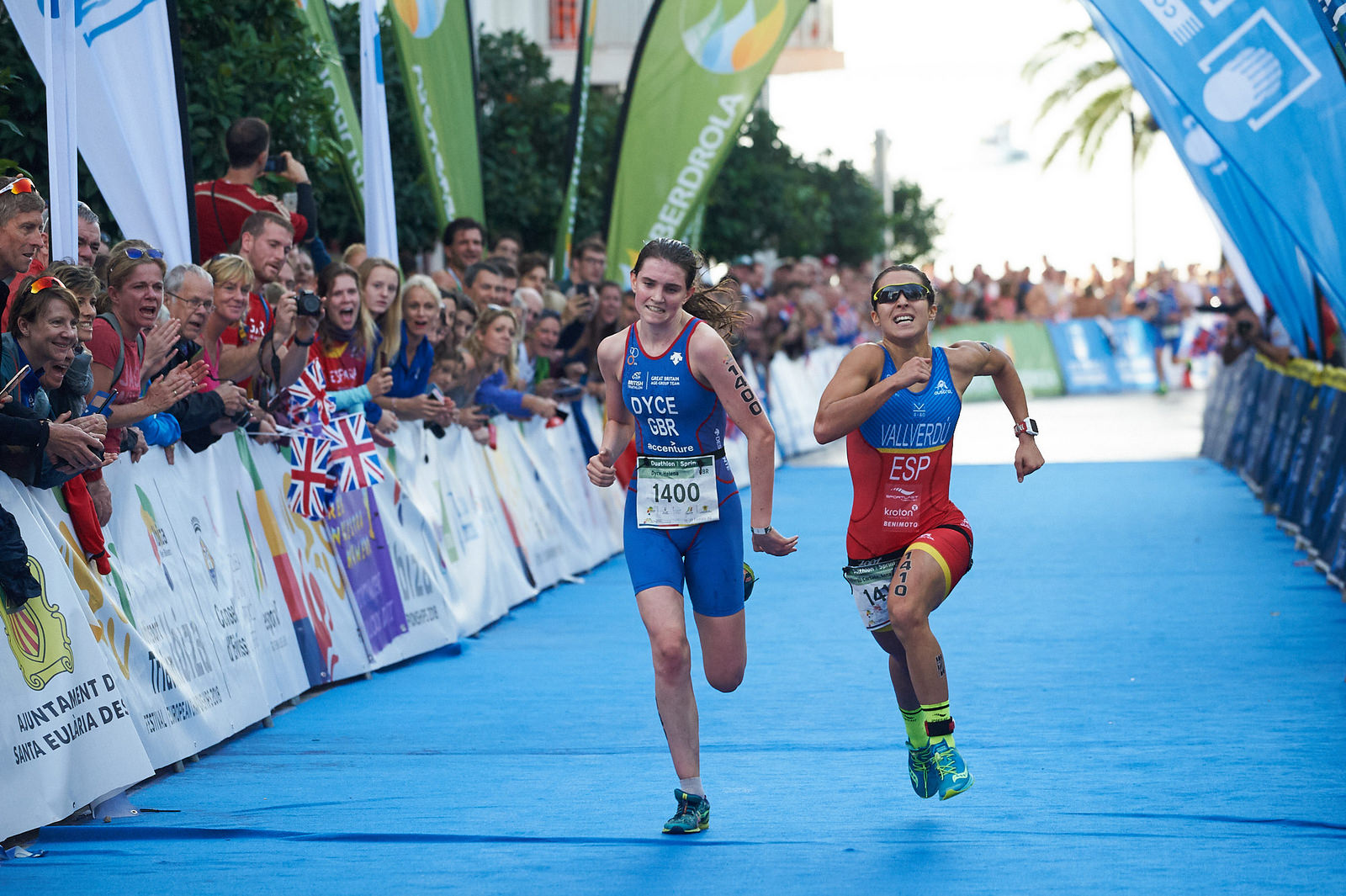
With a great race between Helena Dyce GBR and Anna Vallverdú Cortada, ESP, the crowds witnessed a battle to the line with them both sharing the same time. Dyce, racing in the youngest category had the edge on the first run but Vallverdú had just that bit more power on the bike. The final run took the athletes down to the line. Dyce comes from a strong athletic family and her father, Craig took the title in the 50-54 category, beating his daughter by 6 minutes exactly.
In Dyce “The Younger’s” category, it was an all British podium, with Kim Baptista taking the silver. She went on to win the Cross Duathlon title a few days later and posted the fastest bike split in her category. Bronze went to Daisy May Barnes. The Men’s race also saw a British clean-sweep, with Rhys James taking the title ahead of Sandy Holl, bronze medal-winner in Fyn and William Fadden who has greatly improved upon his 7th in Soria last year.
Anna Vallverdú Cortada’s victory in the 20-24 category pushed teammate Eva Martín-Moreno Jiménez into silver medal position. Running neck and neck over the first 5k, it was on the bike that Vallverdú pulled away and despite a valiant effort in the final 2.5k run, it was not enough to catch up. She went on to both cross duathlon and cross triathlon titles. Behind her, GB’s Megan Powell was first into T1 but lost out to Vallverdú on the bike. It was in the final run that her legs could not match the pace of Martín-Moreno but it was a close-run thing and she missed silver by just a few paces. Still, not a bad year, with a silver in Fyn added to the bronze in Ibiza. Amongst the men, it was David Pearson, GBR who showed real power out on the bike to beat Spain’s Pol Espinosa Valero, whose final run pace was enough to snatch away the silver medal from Felix Wernham, GBR. Pearson’s year has been a successful one, with silver in Glasgow and now the gold in Ibiza.
In the 25-29 category, we saw the fastest run splits of all medal-winners. It was the 2012 World Champion and underwater rugby player, Laura Laermann GER, who posted a 17:52 for the opening 5k and Jonatan Perez-López ESP, ran 15:49. For neither one of them did this pace take them to gold. Both were beaten out on the bike, with Josie Cram, bronze medal-winner in Soria, silver medal-winner in Penticton but reigning World Champion after Fyn taking the ETU title. Bronze went to Daisy Pickles, who with this result, gets her first international podium. It was a controversial podium in the men’s race, with Máté Hadházi taking first place ahead of Jonatan Pérez López. Spain’s Carlos Jávega Saura rounded off the podium. Quite what happened out on the course is unclear but the very visual statement by Pérez made for one of the more unusual photos from Ibiza.
With Sandrine Benz winning the 30-34 category, any chance of a Swiss gold and silver went out of the window when Samantha Fawcett, defending European champion and reigning world champion posting a first run that was just one second behind Benz. This leading pair were a country mile ahead of the rest of the field and Fawcett continued to push the power on the bike to break free of any threat to her silver medal. She lost out to Benz but was comfortably ahead of Nathalie Bleiker. The men’s category was a comfortable win for Daniel Jenkin but it was Victor Carrasco Gil ESP, who posted the fastest final run split amongst all the medal-winners to take silver and to match his Soria silver from last year. Philip Williams came in for bronze, having narrowly missed the podium in Fyn.
In the 35-39 category, the Brits dominated again, claiming all six medals. Christine Burns was just ahead of Sarah Smith, with a victory of just 6 seconds. The bronze medal went to Emma Robinson, who was just 43 seconds behind the winner. The men’s category was a true battle between the Brits with all three medals being won but it was the race for the line between silver, bronze and fourth place that was truly thrilling. It was Nick Samuels, former World Champion, who led the run into T1.
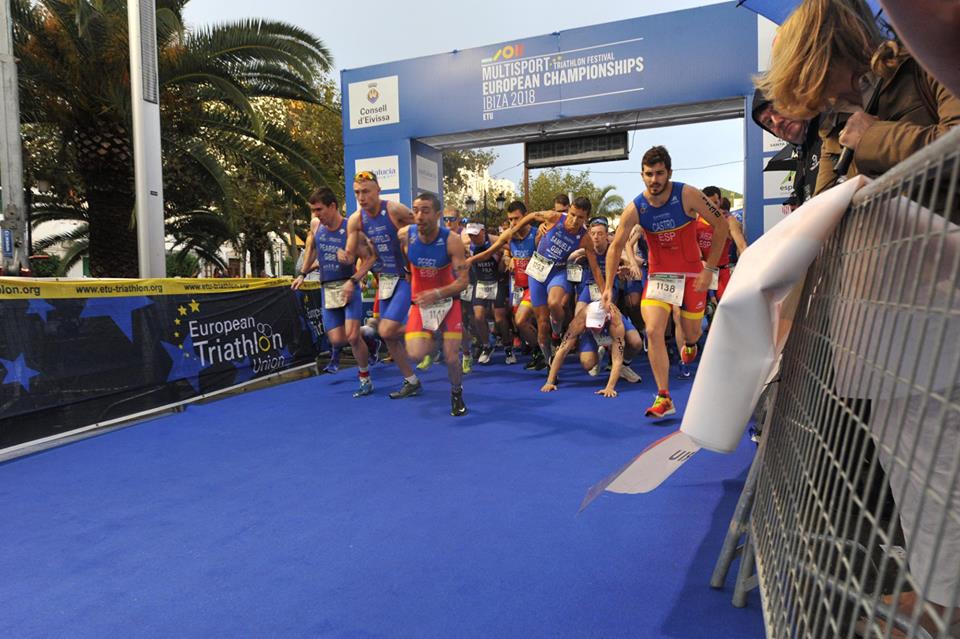
In weather that simply could not make up its mind, the start nearly saw Samuels bowled out of the race but this added adrenaline just seemed to push him harder and he soon put his mark on the race. The real threat to Samuels came from the powerful cycling of Ryan Smith. European champion in 2017, Smith has had top ten finishes in the sprint triathlon championships over the past two years. With the final run and the pace of Samuels, the work he had done on the bike was not quite enough to take the gold but it gave him just enough to hold off the attacks of the 2017 runner-up, Bruce Raesdie who took bronze just two seconds ahead of Luke Worthington, who matched his finish place from Soria.
In the women’s 40-44 category it was again a clean-sweep for Team GB with the defending champion, Gwen Kinsey and Stephanie Maclean Dann coming into T1 together just a few seconds adrift of the leading Spanish athlete, Núria Ribalta Ferrer. Once out on the bike and Kinsey attacked. No stranger to the top of the podium, with wins in both triathlon and duathlon since 2015, she dominated the 20k bike and then set off to scorch around the final run to secure a comfortable victory. Maclean Dann came home for silver and bronze went to Marie Brush whose medal matches the one she won in Fyn.
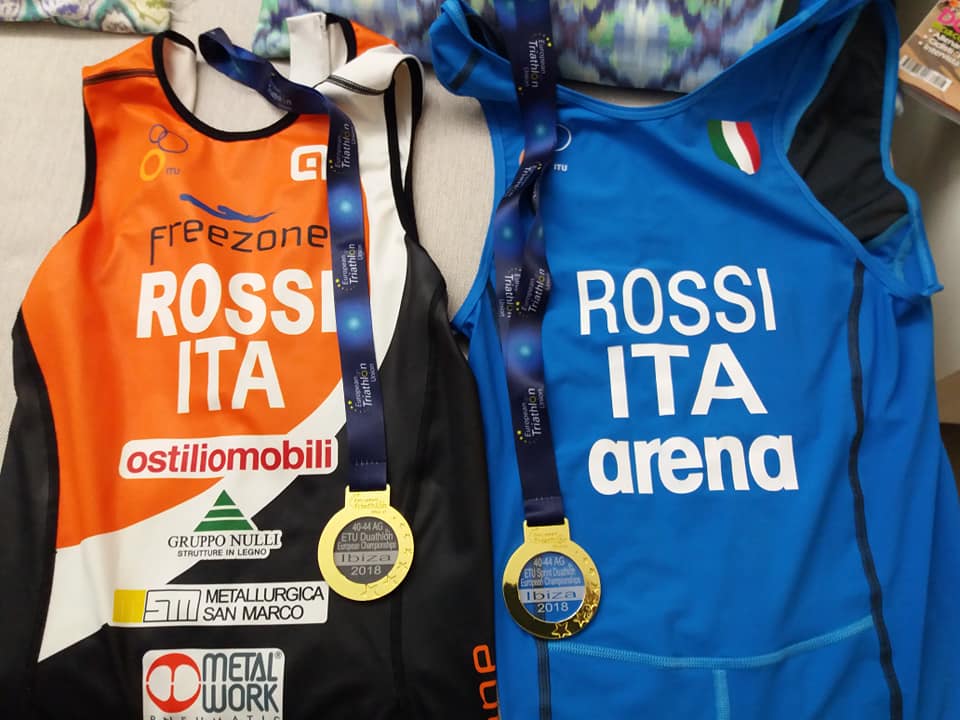
For the men, it was Italy’s Huber Rossi, who ran away to gold. His opening run of 16:07 gave him a clear advantage over the world champion, Rafael Curado Tejero. Runner-up in 2016 and 2017, Great Britain’s Jonathon Hoggett was strong on the bike and ran into the bronze medal position behind the Italian and Spaniard. Rossi’s victory over both Sprint and Standard distances sets him up as the one to watch in Transylvania.
The 45-49 category saw the medals shared by the hosts and Team GB. Gold went to defending champion, Ella Towers, who ran side by side with Ángela Martínez Payá who wasmaking her debut on the international circuit but then pulled away on the bike to run clear over the final 2.5k to victory. Behind Martinez came Lindsey Lewis-Painter. Her local newspaper reported on the bronze medal win and they really capture the essence of Age-Group racing “This is the first time Lewis-Painter has represented her country and she said: ‘I am so proud to have been selected to race for Great Britain. I raced the best I could and just kept pushing myself through to the end. I am so happy to have finished on the podium. My husband and children have been so supportive, as have all my friends back at home. I just hope I have done them proud.’” Read the full article here. The defending champion, David Vargas Ansia ran hard for the first leg, with the crowds cheering him on but with the slippery roads, it was the skilful riding of David Horne and Michael Buchallet, runner-up in Soria and bronze in the worlds in Fyn who pushed the pace, creating a British gold and silver with Horne having the advantage on the bike and just the edge on the run to take the title. The two Brits were the only ones to break 10 minutes on the final run.
Defending champion, Jacqui Phillips was last of the Brits in the lead group to enter T1. It was Pauline Munro who led them around in the 50-54 category. This leading group were comfortably ahead of the challenge from Germany. Speedy transitions saw Phillips leave more or less with Cathy Dawson, 2016 World Champion and runner-up in Fyn. Powerful on the bike, the pair soon passed the early leader Munro and Katherine Davies but it was Dawson’s final run that led her to the title ahead of Phillips. Davis held on to take bronze with her stronger bike and run combo being just too much for Munro. The defending champion was magnanimous in defeat, “Not a great day for me today. You can’t afford not to be 100% at the Europeans, too many other good competitors ready to take over. Absolutely shattered now after a hard battle with Cathy Dawson who was just too strong for me today. Silver medal to add to the collection.” Dawson’s progression has been impressive, with the Penticton bronze followed by a Fyn silver and now the European title and an Ibiza gold. Wayne Aylesbury came to Ibiza with the confidence of a two-time European champion and two-time world champion. 2016 and 2017 saw him dominate the sprint distance duathlon but his pace only showed in the final leg. It was team-mate Craig Dyce who stormed to the front with a 17:02. Dyce and his daughter, winner in the 16-19 category, show just how great it can be if the whole family trains and races together. Dyce stayed ahead of the Spanish challenge from Tomás Pérez Cervantes to run home for gold. Aylesbury rounded off the podium with bronze.
As Dyce celebrated with his daughter, Pérez was full of praise for his wife, “Subcampeon de europa en duatlon de 50 a 54 años, gracias a todas esas personas que me han dado su apoyo ysobre todo Silvia mi mujer por aguantarme todos estos años 25 años casados y espero celebrar otros 25 años mas. / Runner-up in the European 50-54 category, thanks to everyone who supported me, especially Silvia, my wife, who coped with me for 25 years. 25 years of marriage and looking forwards to another 25.”
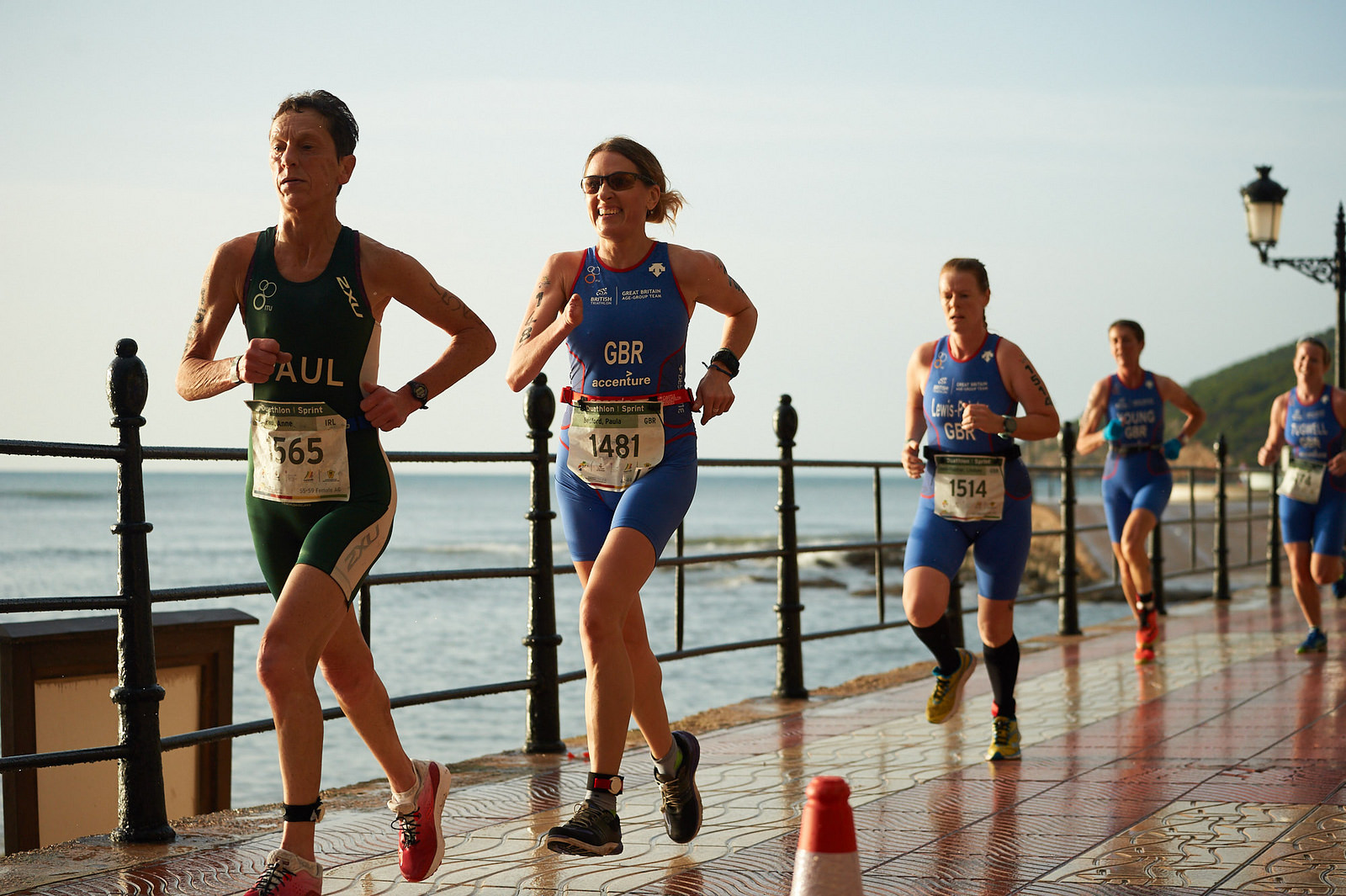
It is always nice to see Anne Paul race. She has been part of the duathlon scene for over two decades, has raced as an elite athlete up to 2005 and since 2007 has raced as an age-grouper, also dedicating her time to coaching in Ireland. 2007 and 2011 European champion, she had a few years off before coming back to race in Rotterdam where she narrowly missed the podium, only for the same thing to happen in Glasgow.
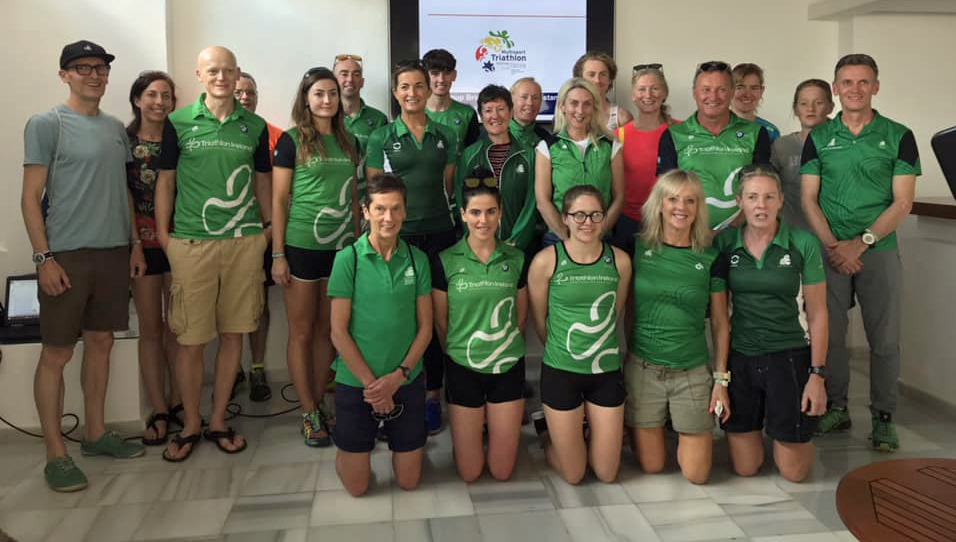
Coming to Ibiza, accompanied by a large Irish Age-Group team, she knew this race would be a test for her. It was one that she passed by claiming bronze for her country. She was however, no match for the stunning pace of Italy’s Marinella Sciuccati who also took silver in the standard distance event. With time to reflect, she summed up the delight of the Italian team, “L’Italia si classifica terza, dietro all’ Inghilterra con una presenza massiccia di atleti e la Spagna che giocava in casa AZZURRI SIAMO STATI BRAVI”.
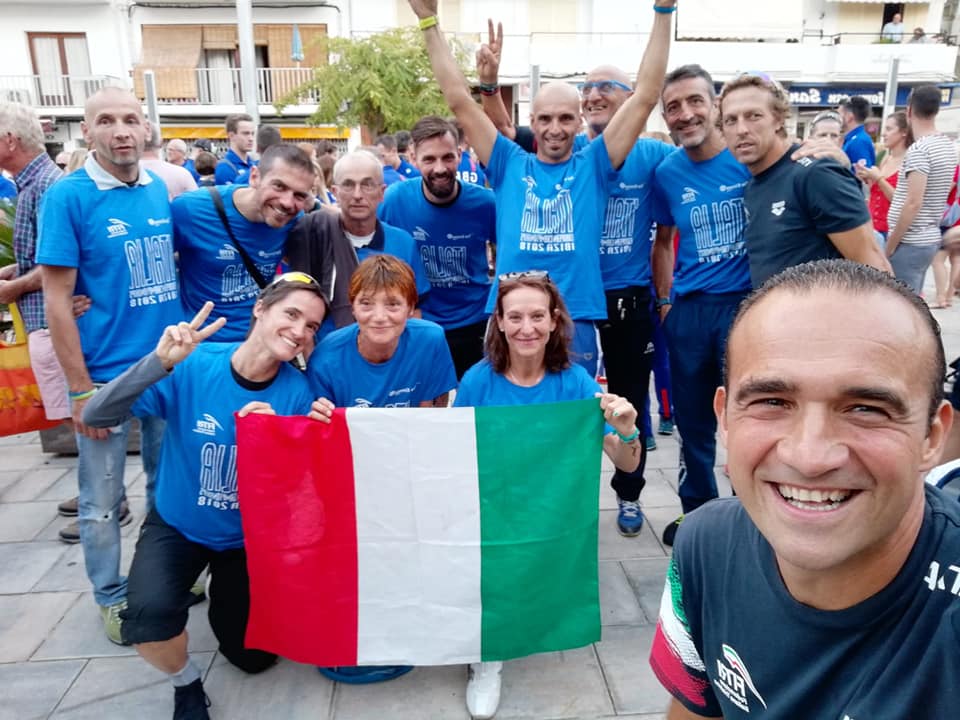
Sciuccati dominated the race to claim the title by over three minutes. Silver went to Rachel Edwards who missed the podium last year in Soria by just a few seconds. In the men’s 55-59 category, there was a thrilling battle for the title, with just two seconds separating gold from silver. On the start line was Spain’s Manuel González Ojea. As defending champion, he has also held the world title from Zofingen and from Pontevedra back in 2014. He went on to win the standard distance title here but was unable to match the blistering pace set in the first run by Frenchman, Didier Valladon. Having posted a 35:27 for the Cannes 10k earlier in the year, he was certainly one to watch. He arrived in T1 36 seconds ahead of Switzerland’s Aeneas Appius, the 2017 and 2018 World Champion and runner-up at the ETU Powerman Vejle middle distance championships earlier this year. Valladon lost valuable seconds in transition as Appius sped through and set about chasing the Frenchman. It did not last long as the immense power of Appius took him up to and then past the leading Frenchman. Behind him, GB’s David Ardern, bronze medal-winner in Fyn was pushing the watts on the bike and with the fastest split of the day was in contention and past the Frenchman. Ardern had run together with Ojea but left him behind on the bike with his focus now on the red uniform ahead. Quite what happened in T2 we do not know but that final run of Ardern was so strong and he came so close to Appius on the blue carpet.
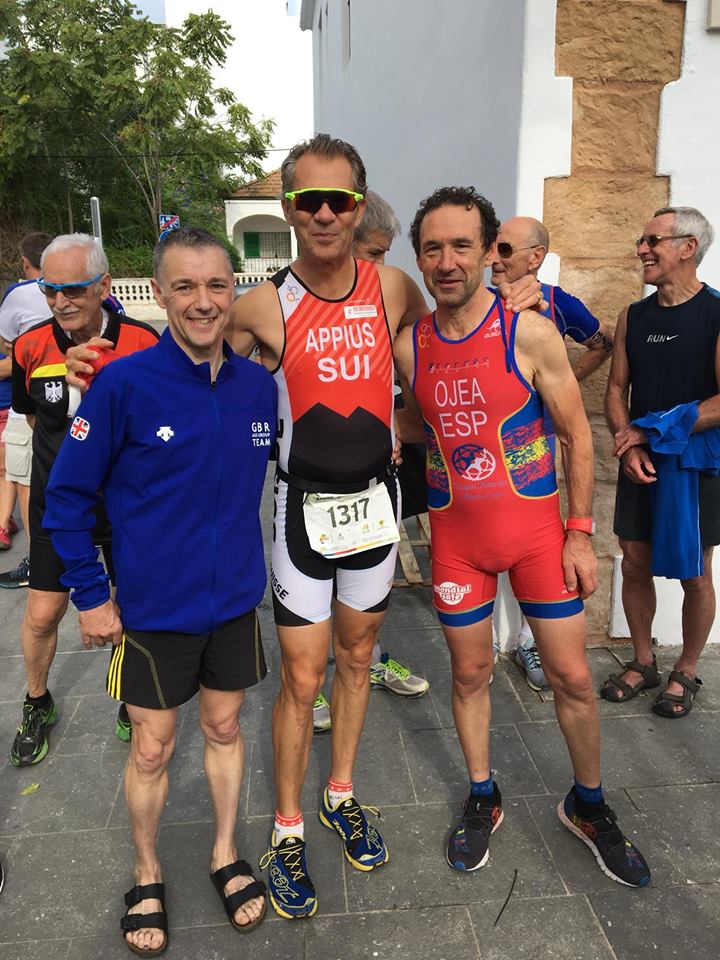
The victory went to Appius but this battle was easily one of the best. Swiss Triathlon has dedicated time and resources to the promotion of duathlon and this is reflected in the stunning performances we have seen. “Duathlon Sprint European Champion M55 2018. I did it again. Yeaaaah. Won by 2 sec. in sprint finish. Very fast race in Ibiza morning rain on slippery ground. My Swiss Duathlon Age-Group Team with Delia Sclabas Junior Woman wins 4x gold and 3x bronze. Swiss Medal RECORD!!!!!”
Great success for Switzerland but for the British athlete who came home for silver, there is an even bigger story. He was diagnosed with stage 3 stomach cancer in 2013 and underwent some pretty dramatic surgery. He had a bucket list and on that was to race for Great Britain. You can read the full story here and see how he benefitted from specialist care.
The 60-64 category saw the British women once more sweep up all the medals. In fact there were no other nationalities racing. Astonishing really, that no other nation has any women duathletes in this age-group. Despite the lack of other nations, the race was nevertheless an exciting one, with Heather Lambert and Sue Clarke coming into T1 side by side. They had broken away from Marie Kille who had decided to race even though she had a broken and pinned wrist only very recently and it was Lambert, with the faster transition, who led out onto the bike where she steadily pulled away to create a commanding lead. Reigning world champion, Clarke was unable to respond to the power of Lambert who, not satisfied with just the lead, kept up the pace and crossed the line to take the title with over two minutes to spare. Clarke came in for silver and Kille, despite her stronger bike leg, was to take the bronze medal as once again Clarke was stronger on the final run. Lambert’s bronze in Aviles, followed by a silver in Penticton and now the gold in Ibiza shows steady improvement and we look forwards to seeing her race in Transylvania. The men’s race was once again dominated by a Swiss athlete. It was Reinhard Pöllinger who delivered a masterclass in duathlon, with the fastest split in run, bike and run. He crossed the line with almost a 3-minute winning margin in his first international outing on the circuit. Silver went to GB’s Phil Hurr, who had raced to bronze in Fyn. Bronze went to Philip Taylor.
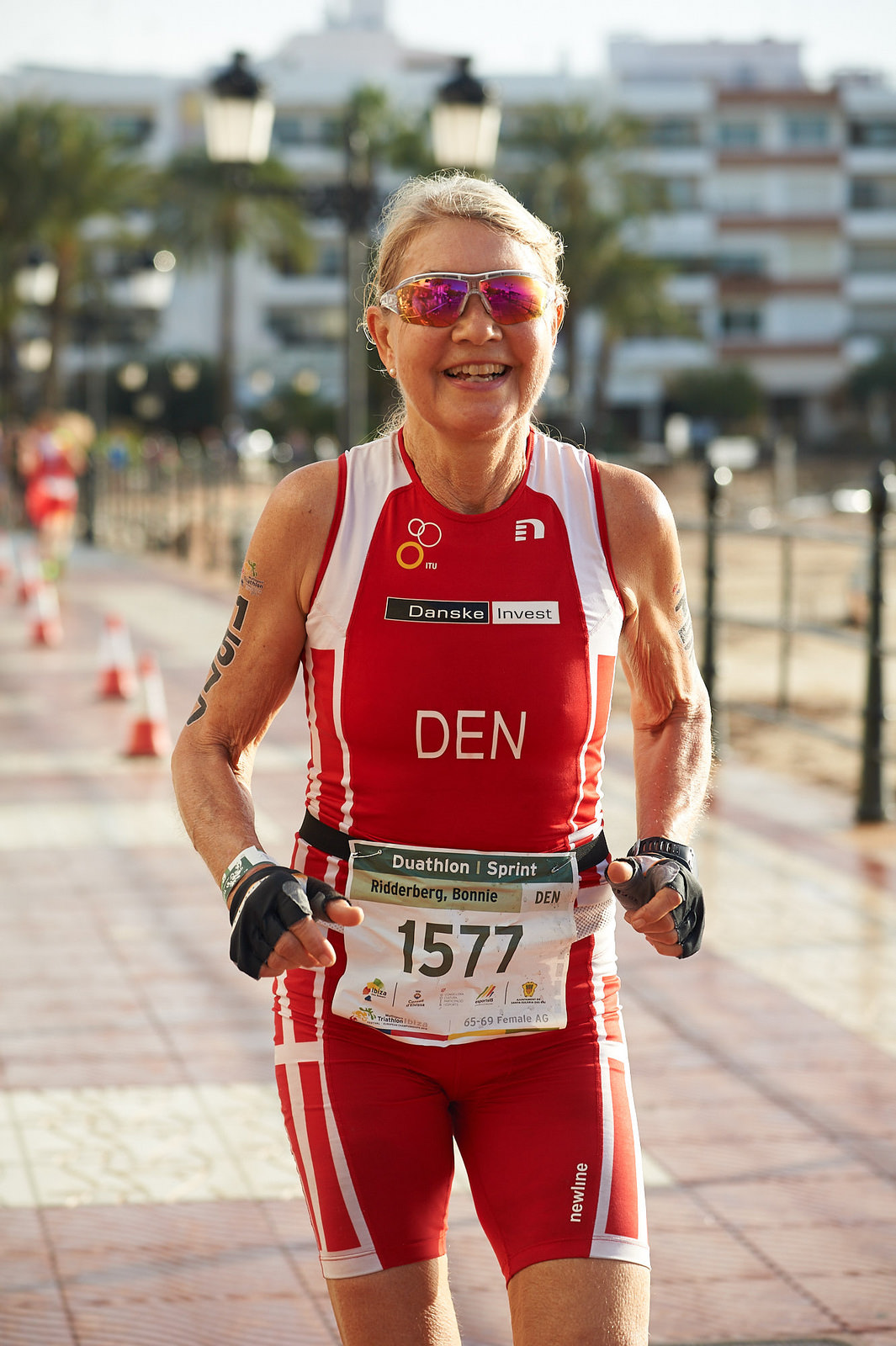
Moving up to the 65-69 category and it was a massive, convincing, dominating victory for Denmark’s Bonnie Ridderberg. Having come to notice first in the ETU-Challenge Middle Distance triathlon championships in Herning in 2017, with a silver medal, she went on in 2018 to scoop up a whole series of medals, starting with the ETU Powerman title in Vejle, then as runner-up in Fyn over the sprint distance and, adding a swim to the mix, with the silver for the Long Distance triathlon. Coming to Ibiza, the sprint title went comfortably to her along with a bronze in the standard distance and a silver in the Middle Distance triathlon event. Ridderberg was all-powerful. Bernadette Rudman led Sue Graves to the podium. Next year sees Graves move up a category and with her previous history of racing, we can expect to see some more podium finishes, however, as Ridderberg also moves up, she will have a her work cut out. The men’s race was so very nearly a Spanish clean-sweep. On paper, the favourite was Serafin Torres Torresano.
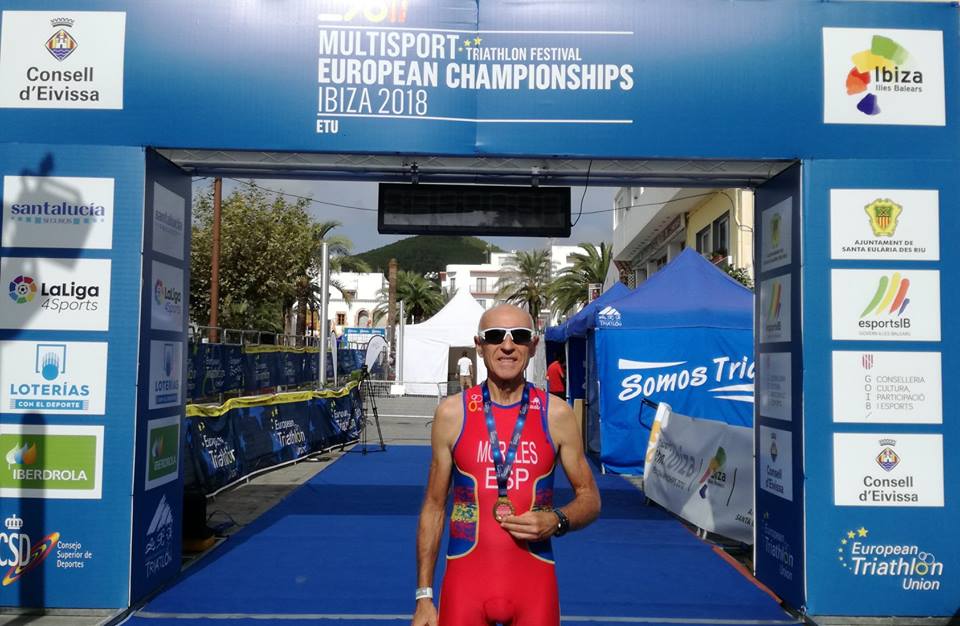
As defending champion, he had also beaten teammate, Fransico Morales Tornel to the podium to claim bronze in 2016 at the Worlds in Aviles but they would have GB’s John Peacock who came to Ibiza with a runner-up medal from Fyn. As the first run unfolded, it was Morales, 2015 ETU Champion, who took the lead, with Peacock and Torres neck and neck. Peacock lost valuable time in T1 but made up for that on the bike, pulling away from Torres. He was unable to catch Morales, who went on to win comfortably, with Torres rounding off the podium.
In the women’s 70-74, we got to see a great race between the top duathletes in this age-group. Italy’s Lucia Soranzo. With six titles as a duathlete and coming to Ibiza as defending champion, she faced Helen Hayes, 2014 ETU Powerman Champion, Glasgow and Gold Coast bronze medal-winner and the relatively “new on the block” Pam Oliver, who took bronze last year in Düsseldorf and then beat Hayes in Glasgow. It was Soranzo who set the pace and opened up a lead of about a minute heading in to T1. The Italian then pushed hard on the bike to keep ahead of Oliver who was chasing and who had shipped her chain on the mount-line, losing valuable seconds. Oliver managed to pull back some of the lead but with the final 16:02 run, the Italian had done enough to add this Ibiza title to her collection. Oliver’s performance is a signal to the rest of the British team and although she could not match Hayes on the bike, who posted the fastest split, her running was enough to push Hayes onto the 3rd place on the podium.
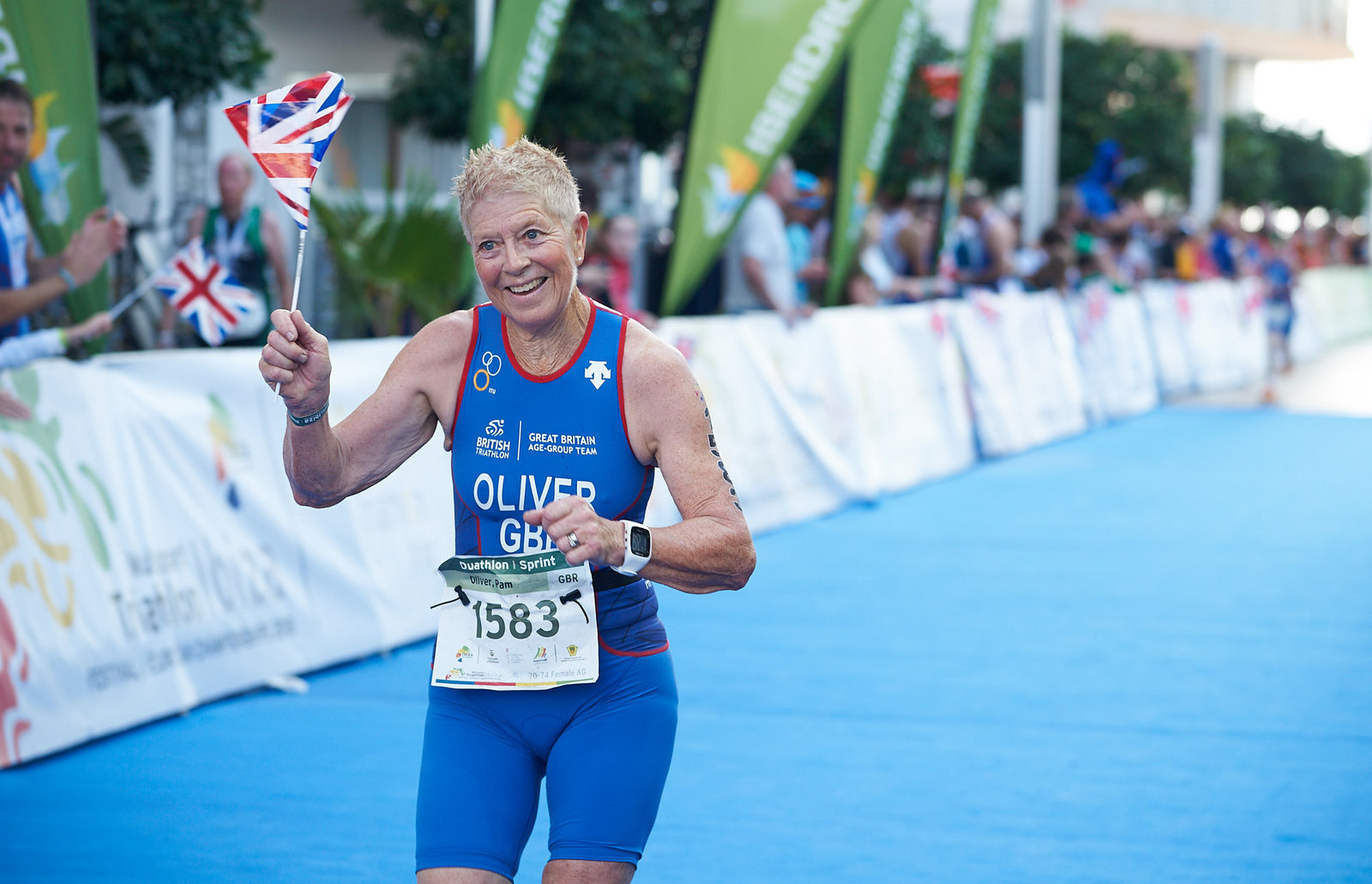
After the race, Oliver summed up the emotions, “Saw the Italian coming back at turn around not too far ahead but she was a much better runner and was waiting for me at the finish. I have no regrets I did my best and got silver. I told David before going onto podium that I couldn’t look at him - I knew I would lose if I did! I have to say that triathlon and duathlon are very friendly sports - the support of the crowds was unbelievable. The oldest men’s age group was 80-84 there was a Russian and a GB athlete - they got a standing ovation and the biggest cheer a lot of us had moist eyes-to think if we are lucky enough we could still be competing at their age - I hope!”
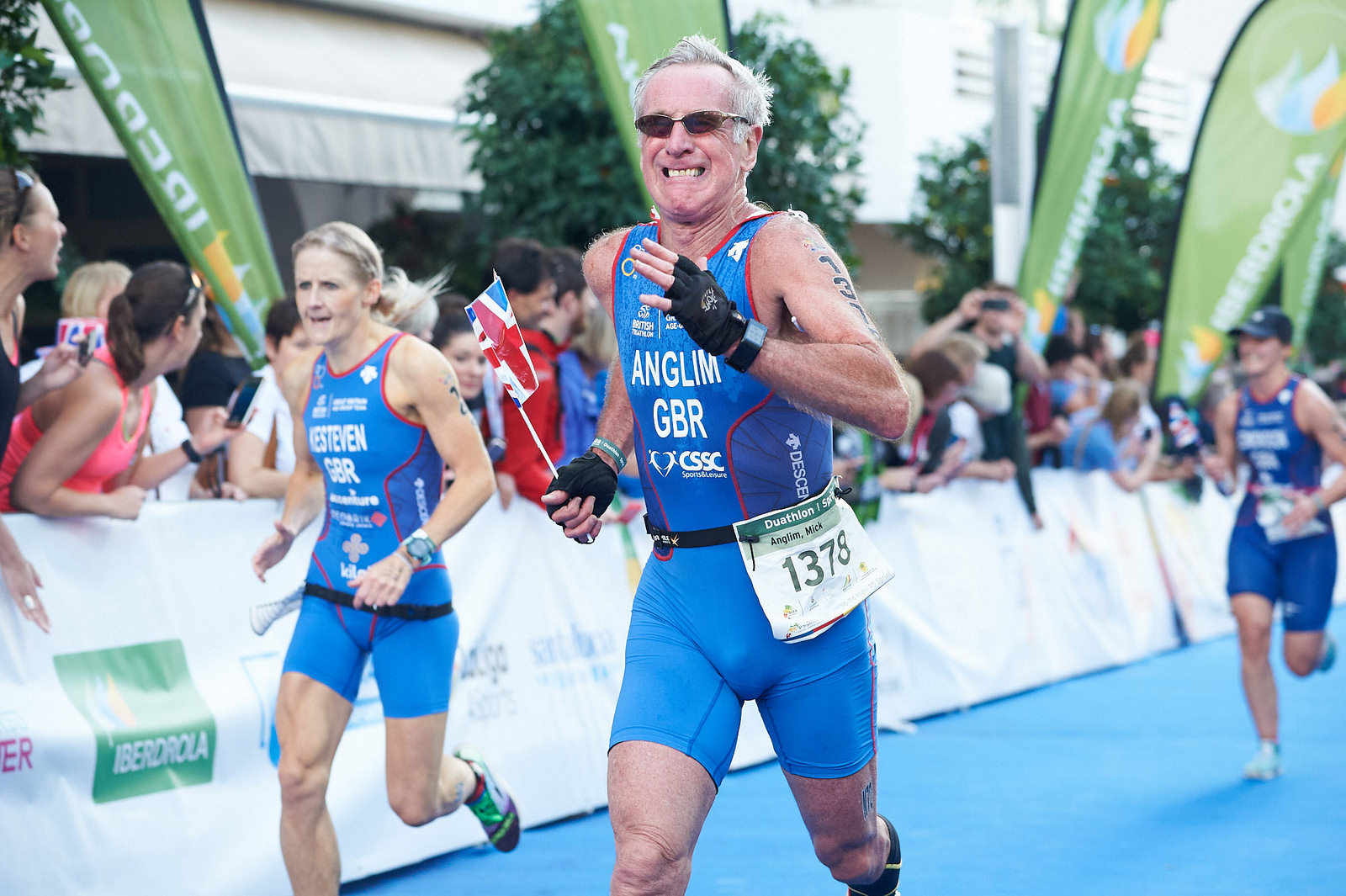
The men’s race saw Team GB’s Mick Anglim step up to the start line once more. This remarkable athlete, born in 1947, has notched up 18 podium appearances and 8 wins. 2017 saw him win the European title in Soria as well as Sankt Wendel. He went on to claim the silver in Penticton over the sprint distance and bronze over the standard distance before claiming two silvers in Denmark; firstly in Vejle in the ETU Powerman race and then in Fyn over the sprint distance. An immensely powerful athlete, he might well have been surprised by Joachim Bernhardt GER, who ran away at the start but once on the bike, it was Anglim’s power that saw him ease past the German to take control. The final run allowed him to ease off and cruise home, defending his title and claiming the gold. It was his teammate, John Caborn who upgraded his Soria bronze to a silver, with a good bike and a run that stole the medal from Bernhardt.
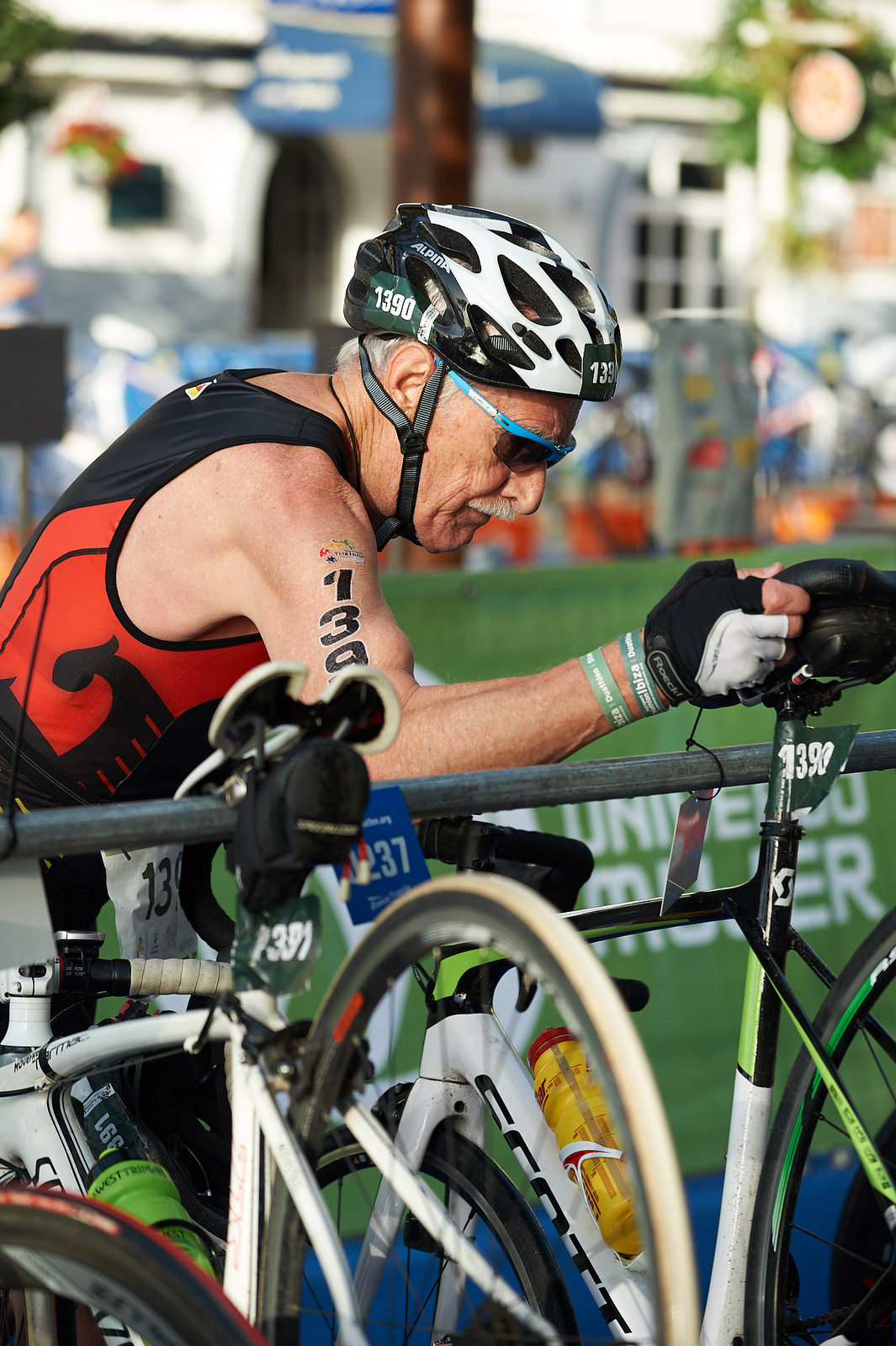
The final two categories were men-only events but both races served up thrills for the spectators. In the 75-79 age-group, only nine seconds separated gold from silver as Günter Birnbaum, born in 1939 flew the German flag high as he raced around the course to lead them into T2. His opening run was over 30 seconds quicker than Francisco Cipriano POR. Birnbaum has regularly mixed his racing, making appearances at off-road events, winter triathlon events and duathlon events. He claimed the title in the inaugural ETU Cross Duathlon Championships in 2015 that were held in Castro Urdiales and then went on to win bronze in Kalkar before heading to snowy Estonia, where he claimed the silver medal in Otepää in 2017. Cipriano proved too strong for the German out on the bike but Birnbaum came back on the final run. As the two athletes raced the final 2.5k, the gap looked as if it would be closed but the Portuguese athlete somehow managed to hold on to his lead and crossed the line just 9 seconds ahead of the German. Behind them, it was GB’s John Nugent who had put in an impressive bike leg but who faded on the final run, who claimed bronze.
The oldest category is always one that attracts attention. Any race that has Boris Kirilov and Kevin Robinson in it will be one to watch. Both born in 1935 and both posting finish times that were faster than the category below them, it was the Russian multiple World and European champion who ran to the front. 5k in 30:19 at the age of 83 is remarkable. Robinson’s 32:47 would see him finish ahead of many on a parkrun who are half his age. The bike course saw Kirilov extend his lead and, despite digging deep on the final run, Robinson’s faster split was not enough to get him any closer to the jubilant Russian. Gold to Russia. Silver to GB. Adulation to the oldest athletes and a reminder to everyone that participation in multisport is open to all ages.
Article gallery
Related Event: 2018 Ibiza ETU Duathlon European Championships
| Results: Elite Men | |||
|---|---|---|---|
| 1. | Yohan Le Berre | FRA | 01:48:41 |
| 2. | Benjamin Choquert | FRA | 01:48:46 |
| 3. | Emilio Antonio Martin Romero | ESP | 01:50:13 |
| DNS. | Emmanuel Lejeune | BEL | DNS |
| LAP. | Ander García Rendo | ESP | LAP |
| LAP. | Wesley Mols | NED | LAP |
| DNF. | László Tarnai | HUN | DNF |
| DNF. | Thomas Huwiler | SUI | DNF |
| DNF. | Angelo Vandecasteele | BEL | DNF |
| DNF. | Jonas Hoffmann | GER | DNF |
| Results: Elite Women | |||
|---|---|---|---|
| 1. | Sandra Levenez | FRA | 02:01:23 |
| 2. | Sandrina Illes | AUT | 02:01:53 |
| 3. | Irene Loizate Sarrionandia | ESP | 02:01:57 |
| 4. | Georgina Schwiening | GBR | 02:03:04 |
| 5. | María Varo Zubiri | ESP | 02:03:21 |
| 6. | Petra Eggenschwiler | SUI | 02:04:41 |
| 7. | Sophie Van Der Most | NED | 02:06:23 |
| 8. | Sonia Bejarano | ESP | 02:10:11 |
| LAP. | María Rico Meneses | ESP | LAP |
| LAP. | Marlou Bijlsma | NED | LAP |
| Results: U23 Men | |||
|---|---|---|---|
| 1. | Arnaud Dely | BEL | 01:50:34 |
| 2. | Javier Martin Morales | ESP | 01:50:53 |
| 3. | Nicolas Tilman | BEL | 01:50:59 |
| 4. | Krzysztof Hadas | POL | 01:51:11 |
| 5. | Jonathan Wayaffe | BEL | 01:51:16 |
| 6. | Arnaud Mengal | BEL | 01:53:32 |
| 7. | Thomas Cremers | NED | 01:53:39 |
| LAP. | Wesley Mols | NED | LAP |
| LAP. | Ander García Rendo | ESP | LAP |
| DNF. | Jonas Hoffmann | GER | DNF |
| Results: U23 Women | |||
|---|---|---|---|
| 1. | Irene Loizate Sarrionandia | ESP | 02:01:57 |
| 2. | Sophie Van Der Most | NED | 02:06:23 |
| LAP. | María Rico Meneses | ESP | LAP |
| Results: Junior Men | |||
|---|---|---|---|
| 1. | Romaric Forques | ESP | 00:58:14 |
| 2. | Vitalii Vorontsov | UKR | 00:58:16 |
| 3. | Daniel Albitos Gomez | ESP | 00:58:38 |
| 4. | Joey Van 't Verlaat | NED | 00:59:19 |
| 5. | Olaf Jan Bosscher | NED | 01:00:48 |
| 6. | Ángel Puertas Fernández | ESP | 01:00:55 |
| 7. | Maxime Juillerat | SUI | 01:05:30 |
| Results: Junior Women | |||
|---|---|---|---|
| 1. | Laura Swannet | BEL | 01:02:27 |
| 2. | Astrid Snäll | FIN | 01:04:15 |
| 3. | Delia Sclabas | SUI | 01:04:31 |
| 4. | Maaike Telkamp | NED | 01:05:51 |
| 5. | Marta Pintanel Raymundo | ESP | 01:06:02 |
| 6. | Marije Hijman | NED | 01:08:38 |
| 7. | Marina Muñoz Hernando | ESP | 01:09:40 |
| LAP. | Lisa Isebaert | BEL | LAP |

